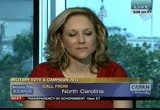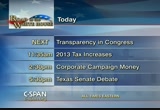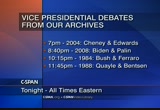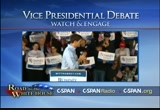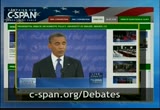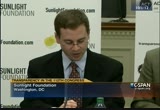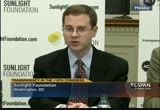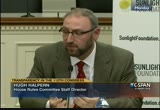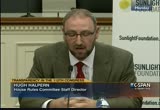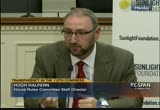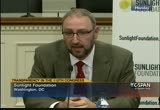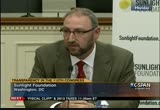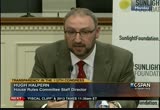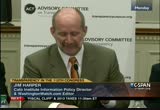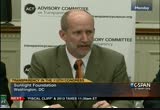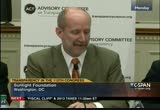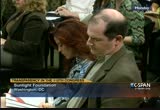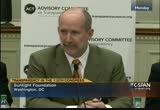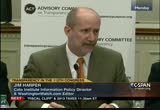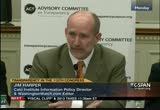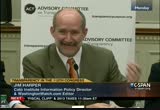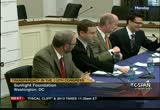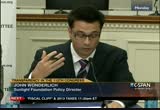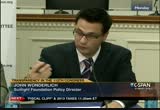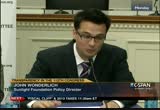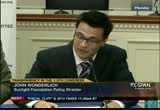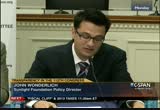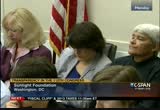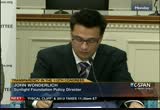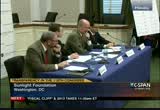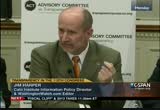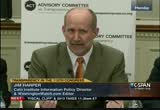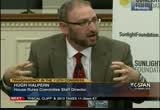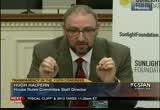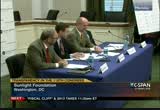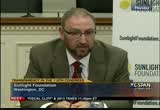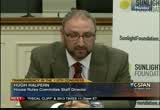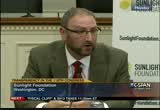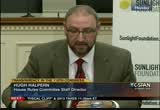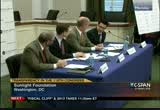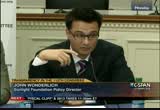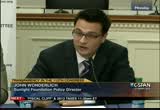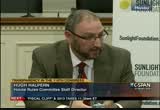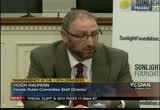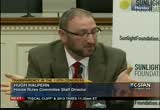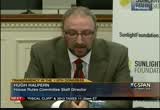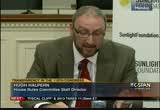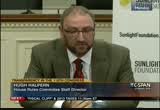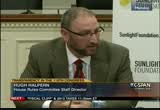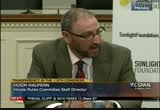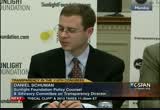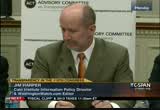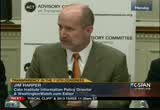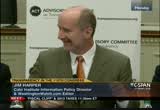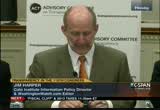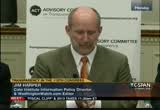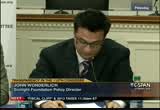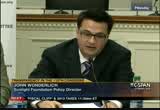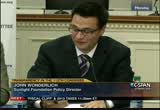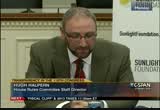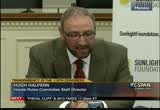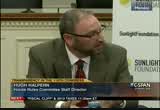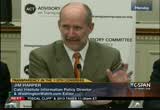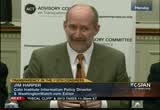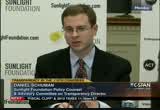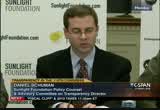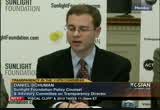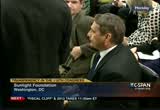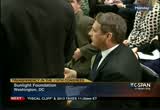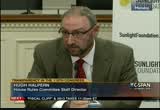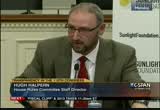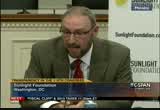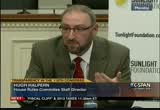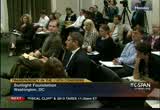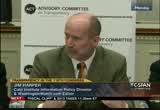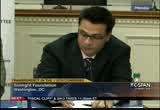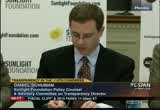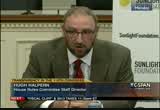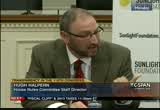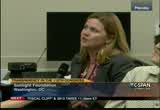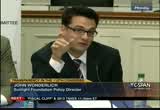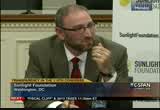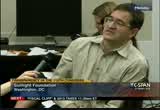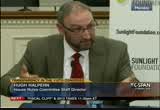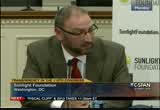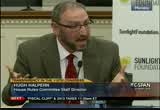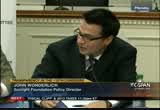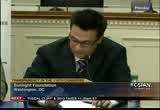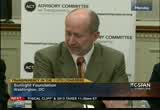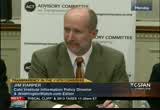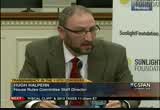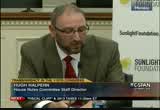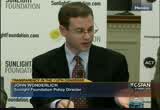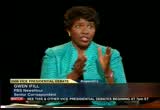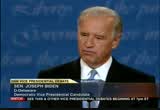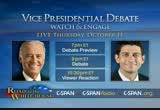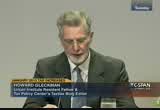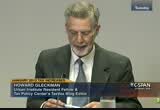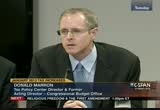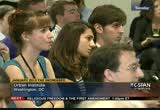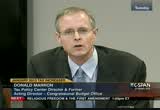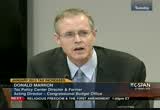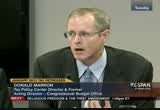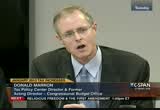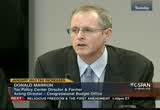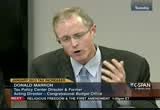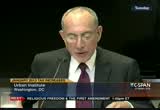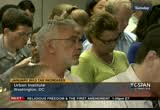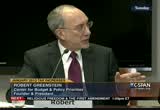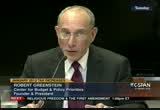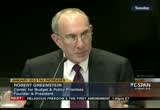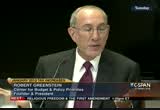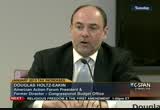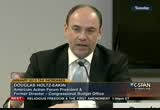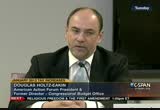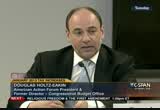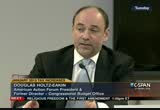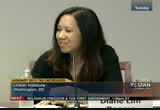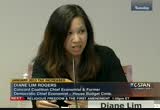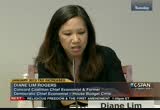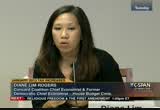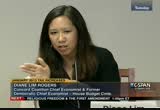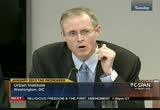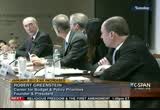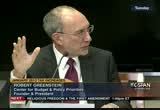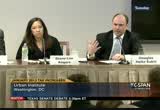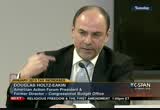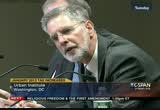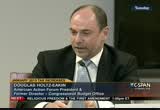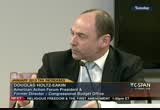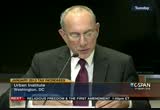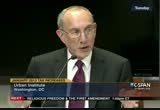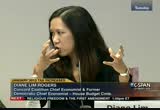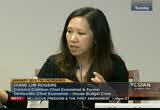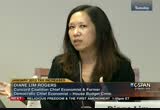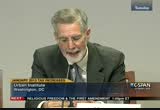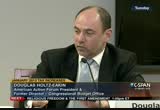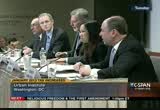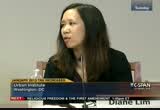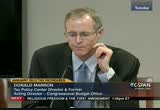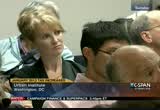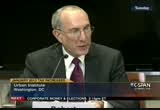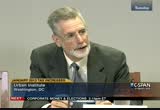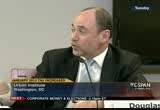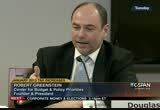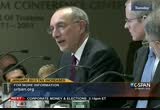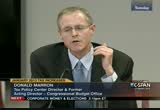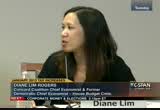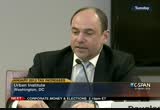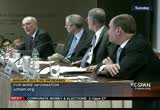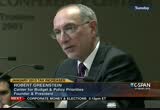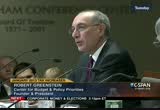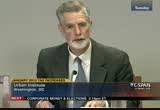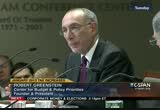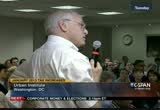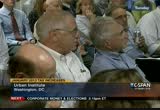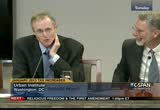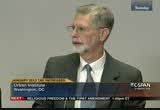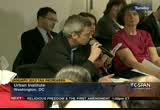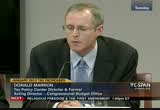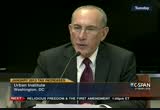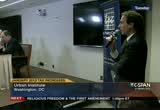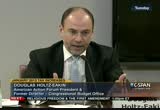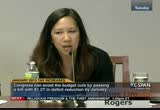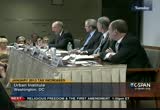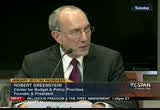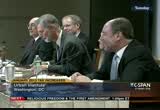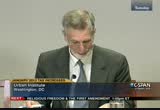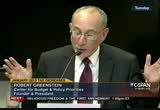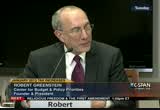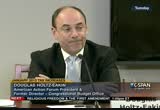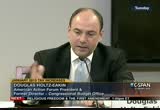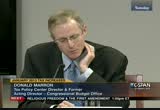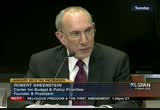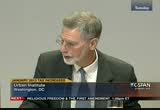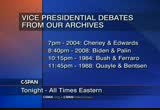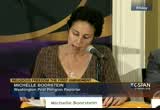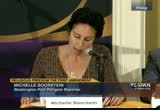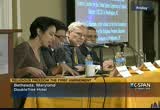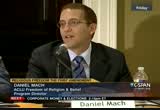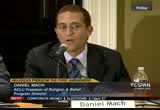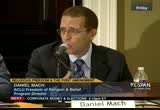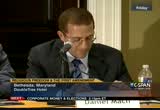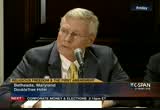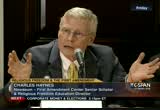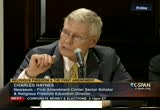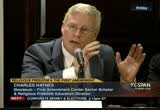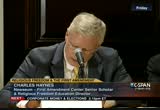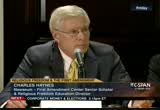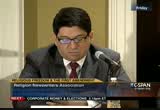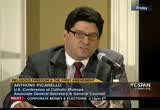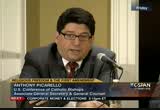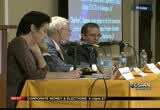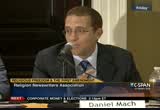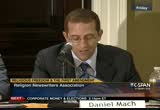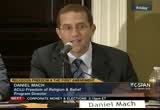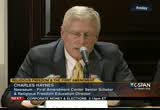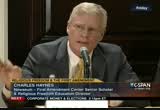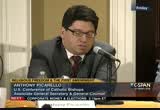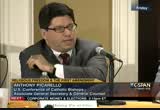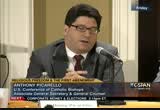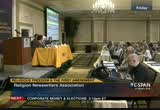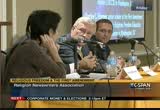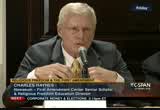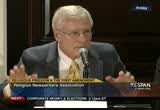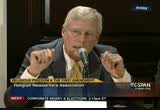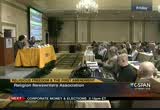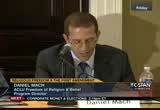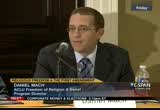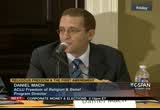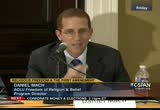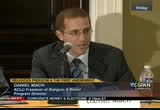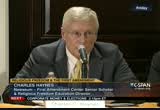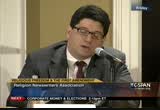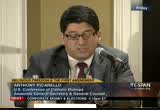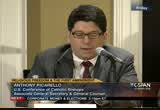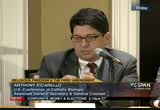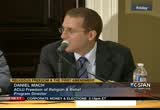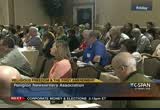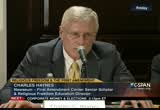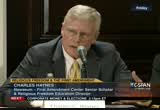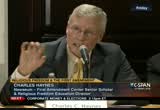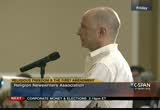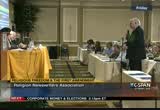tv Washington This Week CSPAN October 6, 2012 10:00am-2:00pm EDT
10:00 am
here it is october. it was all confusing for a soldier in the field to come back and ask what i should do. some of them did not know how to fill up a package to send back to the state. there was a whole lot of confusion over there. host: looking at this issue between now and election day, what happens now? guest: the registered. ballot register . we have to have expedited mail service. we have 30 days until the election. bad at it back. that should have been made to the active duty military. >> you have a web site?
10:01 am
>> concernedveteransfo>> to gueo join us for that. and rebecca will commence -- wilkins. at 930, stephen flanagan will take a look at the latest of what is going on in syria including instances in turkey. a look at the newspapers as well on "washington journal" that starts a 7:00 a.m.. thanks for joining us. we will see you again. [captioning performed by national captioning institute] [captions copyright national cable satellite corp. 2012]
10:02 am
>> see the only vice presidential debate next thursday night live on c-span, c-span radio and online at c- span.org. here is a look at what is ahead today. up next, a discussion on transparency in the 112th congress. that is followed by discussion on 2013 tax increases and the so-called "fiscal cliff." activity p.m., and how corporate money is affecting the congressional races this year.
10:03 am
c-span brings you select a vice presidential debates from the past 25 years. here's the lineup. at 7:00, at dick cheney and john edwards. that is followed by then senator joe biden and sarah palin at washington university. at san 3:00 p.m., a vice president george bush and rep ferraro. at 11:45 p.m., and center dan lloyd and signaturesaid mr. bentsen. >> on the fourth day of being in office, a weaver sitting in the oval office. larry summers was looking at
10:04 am
this year's budget. you're going to have $1 trillion deficit. he said i have not done anything yet. >> we can not keep looking our children in the eye knowing that we're going to give them a diminished future because we're spending their money today. it is a very simple idea. mayor ron and i am going to bring it to washington. we have to stop spending money we do not have. we must cut spending. we must get this balanced budget. we must get this debt under control. >> congressman paul ryan and joe biden will face off in their only debate. martha margaret. you can watch and engage with our live in debate preview starting seven got p.m. eastern filed by the debate at 9:00. your reaction at and 30 p.m. -- at 10:30 p.m.
10:05 am
>> c-span's debate website provides life and on demand coverage of all the presidential and vice- presidential debate. is on a place for you will see live coverage before and after the debate. it has each debate question as a separate. what your critics clips as well and read streaming tweets from political reporters. go to c-span.org/debate. >> the house has done better in making its proceedings more transparent to the public online perce that is according to participants up a foundation event looking at transparency in congress posted this week in washington, d.c..
10:06 am
>> good afternoon. well compared my name is daniel schuman and i'm director of the advisory committee who is hosting this event. this discussion is going to focus on whether congress is serious about transparency. cupe going to explore the progress made and talk about some of the deficits. we're going to do my portion very quickly. what is interesting is what the panelists have to say. let me start by introducing them appeared immediately on my right is hugh halpern. sirs s when the chief adviser on communication patterns appeared to my left is jim harper, the policy studies at the cato institute. he's also the founder of com.ingtonwaatch.
10:07 am
last and not least is john wonderlich, the policy director at the sunlight foundation. abouts more information today's panelists on york shares. i like to thank the representatives who are the co- chairs for giving us the space and the opportunity to have the time year. i promise i will be brief. i will. i'm going to turn it to you. >> thank you. thanks to you and the advisory committee for having me this afternoon. i would like to talk about where we have been over the last two years and where we were headed in the relatively near future. about this time two years ago
10:08 am
our political folks were starting to make noise. it was certainly possible if not likely that republicans were going to going to be a majority in the house again. we are trying to identify issues that would come up during a transition period as many of you know, among republicans one of the big issues was the read the bill issue. making sure that members have the opportunity to see what it was they were meeting on. to think in large part because of the issues surrounding that and the drive to make that available, the hunter and 12 congress really marked the biggest the biggest change in
10:09 am
terms of transparency since the mid-nineties when speaker newt gingrich really puts the library to make thomas and all of that information available. as we have started this during the transition last time around and going forward through this congress, i think the congress has tried to lead on transparency issues. this manifested in a number of different ways during our rules package. most noticeably was the rules change which said for the first time in the history of the republic be paper and electronic versions of a document or equivalents, that is something was available electronically it
10:10 am
was as good as if it had been printed by the government printing office, it delivered over here and then distributed. there were other things we did, mandatory wed casting -- web castin, really pushing companies to do that. as part of the effort to make electronic texts available in serve as a place where we could measure our own efforts to comply with the three day rule. we traded a centralized portugal for text coming up in the coming week. for all of this year that has been online for stuff coming to the floor there a lot of good work from our colleagues that were in the clerk's office.
10:11 am
i would expect that would come on line for commit these early next year. that work is ongoing. looking at the next congress, i do not see the need for a whole lot of rule changes on this front. we're still in the process of the rule changes we made last time and evaluating their impact on what we're doing here in terms of our day to day legislative business. i think individual committees are trying to work really hard to make themselves more transparent. i know we are at the rules committee. i know the last one of these panel discussions i did i was trying to hype a new website. because of the issues that
10:12 am
generally a rise with these things, a little bit late. hopefully this month we will be launching a new rules.house.gov centered on search, it tried to make it easier for everybody to find what they're looking to research. data on line more in structured data formats. i was talking earlier about our rules committee resolution, the rules that provide for consideration of legislation on the floor. right now we are producing good xml on a daily basis, posting its on-line, making it available. we hope to soon be in a position to do the same thing with a committee report which contains the text amendments. as i am sure is going to come up, and there is a lot of interest and bulk data download, of trying to get information out
10:13 am
of our data systems that you all in the public can manipulate and folks up here on the hill can. that is an issue that may not be quite as simple as it appears on first blush. i think the leadership here in the house and our colleagues in the clerk's office and other legislative agencies are all focused on trying to make that happen to the maximum extent we can. over the hundred and 12 congress -- 112 congress, it is something we can be very proud of. >> thank you very much.
10:14 am
>> thank you for mentioning washingtonwatch.com. i see some of the biggest technology blockers are constantly scraping and striving for mention of their sites. that would not seem to hurt very much. i appreciate daniel's work in the work of the sunlight foundation and his perspective on things. it is important to give thing some perspective. i was interested of the mention of the "read the bill" push. that phrase is not really mean that people literally wants, though they may think they want congress to sit
10:15 am
down and and read the bill, is about a broader thing across the country. it is part of a broader push that these are a part appeared when i look at the history of this issue it goes back to the election of president obama and the real energy he brought on the campaign trail in 2008 to the question of transparency and the good government we all in addition. from my perspective by about 2010 that energy had dissipated. a lot of efforts have gone toward a lot of things. we were not seeing that dramatic transformation that a lot of us can visualize. it was a lot happening very much. that caused me to do some work that i will describe here that result in some great that i will talk about. grading is a kroll art but
10:16 am
sometimes a necessary arts. . i looked at the problem of lagging transparency efforts. a look like maybe the transparency community had communicated well enough to the government side what it was we wanted. i sat down with some technical people. i am a lawyer. i have to go back and learn about how these computers worked. i sat down with some data people to try to interpret in language that many policy-makers to understand what data people need. in the paper that most of you have on the chairs, publication practices for transparent government, i summarized those for practices that put the public in a position to make the government transparent. it is not automatic. these data practices can enable
10:17 am
the community to use the information that the government may publish. the practice this are authoritative sourcing, and availability -- uptime, permanence, completeness, bulk and incremental availability, machine discover ability -- located on the internet in a way that machines can come find it. search engines could come and find the stuff you put up. the real key is machine readability, stretching of the data set that the semantic information is available -- structuring of the data set that the semantic information is available. you see the good information is available because the data underlying them israel structured appear decoders' can then go right something that
10:18 am
finds -- underlying them. decoders can then go find them. having a theoretical model for publication of that that is nice and all, but the question is whether the rubber hits the road. that is what it is for comet to communicate to the audiences how we are doing. i have benefited greatly from a number of groups, sunlight foundation being one. they have all participated in helping me figure out how we are doing. the grades are the great i am giving. anything you do not like about them are my fault not the organizations that have helped me. the grades are not good, but the
10:19 am
good news for congress is that the administration's grades are even worse. i will go through some highlights through the congress side. that is what we're talking about. there are highlights. there is a hero somewhere in the person who treated a thing called bio-guide, a deep historical record of all representatives including a distinct identifier for all of them. ecb said this on craig s. -- congressional website. the one flaw around is that we get into mediated through website instead of a direct publication of the data. when we look for house and senate membership, we can figure it out. the websites that intermediate the information we can reverse engineer the data.
10:20 am
a plain old list would be great. i am looking at my own notes on differences. the two sides have interesting quirks. this information of florida debates very successful. now they tweets what bills come to the floor in the next week because of that xml stream. the senate does a better job on publishing and information about committee meetings. that is why they both get a b. i like to see some house versus and its competition. i will say one more thing about bills. what was interesting to me is that the grading, we have
10:21 am
returned to the grading with the great to see here. the great for bills has dropped. i think it was a a- and now it is a b. problem because our expectations have risen. there is a lot more semantic information that could be published in bills to make it automatically discoverable what u.s. code sections are available, what locations are affected, what euros, etc. the grades are there. it is poured and to emphasize that these are a lagging indicator. -- it is important is to emphasize that these are a lagging indicator. there will be more data. the transparency community has to learn how to use it before it will show up in the grades. given the time constraints, i
10:22 am
will not go into the administration's data publication except to say there is still no machine readable federal government organization chart, which is fascinating and scary. it is not available in ways that computers can use. >> thank you very much. we will give back to some of the recommendations you have a. just for a moment i would like to move to john wonderlich. mr. you have the green light on. -- make sure you have the green light on. >> it is great to be with you for a little bit and talked to some of these issues are brown the way congress functions, specifically the house transparency has been with the sunlight foundation since our initial foundation. it is one of my favorite transparency topics. it is one of the things we are more familiar with as you're going through and figuring out
10:23 am
what rules changes what to see in the next congress and house. we are about to be approaching the senate witwhich is disastrously complicated. it is good to focus on the house because it feels more receptive. when i look at congressional transparency, there are lots of different ways to approach that question. there are different ways to look at it. i will pros three broad headings under which i think under which our work can fit. the first is access to the official work of congress. the word "official" is the key word. we have seen progress during this congress and in the last five or so years on this topic. bulk data, while we do not have downloadable access to all the work, there has been a lot of progress on that front. toward the ultimate goal, we
10:24 am
have the commitment of leadership from speaker john leaderr and peter eric kanter. it may take awhile to happen but to have leadership is very important. house.doc.gov has been under appreciated. it's as for each bill, it gives a different format you can download it. shares to the time of day to the minute it was posted. it is really interesting. they give you to the minute the time the bill is posted. i think that is a demonstration of good faith. they're saying we are here for
10:25 am
you to judge us and not exactly how long the bill was on line. that in part was a response to political presser and try to come up with a better way for things to work. the documents can function with the official version. it is not everything we wanted appeared for the long time it was 72 hours for all bills. we will take what we can get. this is a really significant difference to stay in the rules, has to be online for three days. docs.house.gov is largely the way it works. it brings amendments and lots of other meetings that led to it, le. special rolu
10:26 am
sometimes the role has been waived or broken. npr was one that was considered very quickly. that is one topic, access to official work of congress. next i will not spend a lot of time on. it is the question of ethics and influence, whether the unofficial things that dictate what is going on is a bit of the mess because of campaign finance. regardless of your feelings about out campaign finance should be regulated, the current state of affairs is that the law is unclear and no one knows if the decisions will stand or get knocked down. it is insane, the wild west. it bodes poorly for us to understand what powers are at work. it is worth mentioning the stock act recently passed which will have new information for us to sink our teeth into a realm financial disclosures. financial
10:27 am
transactions have to be disclosed monthly. there are certain things in their we worry about. that is a whole nother set of information. the third thing i want to mention is how political power functions. , the structure of the political dialogue. right now it is a mess. this is not the rules committee fault. in ways it is obama's fault. this is something to think about as you think about how the house works and what kind of tools we should build on the outside.
10:28 am
when i look at the different categories of congressional information, it to the things we worked hard on, one is taking advantage of political pressures that exist. nonprofits would love to be able to create political pressure. we take what we can get. for house reform, with the majority changing hands twice in the past six years, a lot has changed recently. that puts the house and a more responsive posture which is good. the other thing is a broad norms are around how housing should function. two things to point out. one is a work like this and the transparency caucus and the housing receptive to outside groups in the public and these questions should be relative to how they function. it is not about raw political power. it is about thinking about how public dialogue should function. one other thing is that some
10:29 am
light has been working closely with the national democratic institute and the latin american network for transparency for legislative transparency for decoration on how legislation should be open. if there is a jerk ration with 40 or so points, -- if there is a transparency with 40 or so points, it can restatements of assets? can we download data? this makes me very glad that we are able to have an institution that is as receptive as it is, where we can come through and see these problems. >> thank you for all of that. i was going to delve into the details. in my be useful to take a step back and ask the question of an
10:30 am
" why should anybody around the general public care about these things?" we're talking about block access. we're talking about xml. why should anybody care? house is relevant to their lives in? house is relevant to the functioning of congress that -- how is it relevant to their lives at? how is it relevant to the functioning of congress? >> the fancy way i talk about this problem is to talk about rational ignorance and rational inaction. if you're not going to be able to expect something irrational, ignore it. the taxes are 50% of all the nation's income. most people are rational and not to do anything about it. in a way it does not matter to people because they cannot affect its. our broad effort to overcome
10:31 am
that does become rational to pay attention to what happens in congress. in more casual way of talking about this is to compare the quality of information you get in different sections of the newspaper. if the go to the weather page you'd it charts and that and graphs that people turn to -- if you go to the weather page use the charts and graphs the people turned to every day. financego to dat pages, you get graphs and data. if the go to sports, you get the detail data on sport i can nothing about. that is the data and in normal newspaper appeared then turn to the national section and you get republicans are gunning for a fight fans center so and so is a real go getter. -- getting for a fight or
10:32 am
senator so and so is a real go get your. if we can move the quality of data that missed out about public affairs to something like the weather page, at the sports page, we will have done something really special. it will be automatic that people care. >> the broader question of why people should care goes back to our foundation as a representative of democracy. bac in ben franklin's day, the tool of choice was the printing press. today those are the google in the youtube and all those other things. we talk about transparency.
10:33 am
we talked about making information available. i have been doing this for more than two decades. i have worked for almost one dozen different members in various capacities. every members consider action to should we make a particular piece of information available is to say "no." why would we put that out there? if a trade a communications problem if we are not directly controlling how that information has used. we need to put the brakes on that. i think the change that has occurred over the last couple of years, and frankly when the majority changed this time around, led the decision was all of this information exists someplace.
10:34 am
the notion that you can control this, that you can just sit on it, is not realistic. better we should be putting that information out there so that individual citizens can make their own decisions, that we can debate these issues on merit as opposed to who has the better data set. i think you are at the front end of that philosophical change. you go from that underpinning to the more concrete examples, at things that were not perhaps getting the best grade on, you need to keep in mind there are 230 years of history here where
10:35 am
we have been doing things in a particular way. to expect that we can instantly flip a switch and suddenly change all of this so it is in the perfect format at the perfect time, they are very lofty goals. there are very hard for us to hit. -- bay are very hard for us to hit. i will yield back. >> i can hear the gears turning from where i am sitting. and let me come back to you on that. there is a case that is often made on behalf of transparency from the congressional perspective as well. it often has to do share the information and resources so
10:36 am
that report reaches all committees for everyone can see the same bill at the same time. >> these are all things that are evolving. i will use the rules committee as an example. in groups where i talk about what the rules committee does, we have a number of different roles. we can use a number of different analogies. one we use is we are both of the traffic cop for the house directing that routine legislative business, acting as the representative to make sure things flow the way they're supposed to. we're also a swat team at the same time. if something bad happens, we are the ones that the call to try to fix it. our website has largely been one
10:37 am
of the focal point for folks trying to figure out what is going on with respect to legislation. we have several different kinds of customers. we have internal customers, individual folks and member offices who are trying to breach of their boss of on whether the amendments were jailed on what are the amendments rejiggered their boss on what are the amendments -- whether what are the amendments. we have interest groups and lobbyists and folks like that were trying to advise their clients as to what is coming down the pike and what they need to deal with. and we have the broader classes of constituents are just trying to follow and issue that is of interest to them for whatever
10:38 am
reason. and frankly, academics, people who are trying to figure out how the institution works. all those folks are coming to us to try and get that data. it does not hurt that the way the majority and minority have been doing battle at the rules committee since i was a members driver a very long time ago, it has been through system six wars. he was more open? who is not? i have been through a battle on that. it provides the message that we're looking for. i think the philosophical underpinnings both with what we have been doing, what we hope to
10:39 am
do with our website here when aunch this try to make the information more accessible to all of the audiences. a good example of a small change is a couple of years ago we started providing a complete list of amendments that were submitted to the rules committee and something along with the tax an indication of how they were disposed of. we started doing that on the table. one of the things they're building into this iteration is the ability to manipulate that table, to sort columns so you can instantly see what got made in order and what did not.
10:40 am
other folks can use that as they want to. we should not be watching plan bp. >> do want to talk about the interior or the broader? >> on the broader point, almost everyone in the u.s. was politically aware was angry in the last decade about the 72- hour rule. they're either angry about the patriot act for the health care rule.
10:41 am
their rallying cry against the health care bill was about running it and it was too long. what i hope is that we can be be on some of that and that politics is always going to have some elements of procedural acquisitions that go back and forth. if you look broadly enough, and there is such a thing as progress on progress issues, that if you go far enough back of there are things that are clearly worse the we have gotten better at. over time the goal is to do substance the merits. over time we're making something that works better and results in having people feel powerless. that to me is overall what the
10:42 am
goal should be. even more specifically, one reason this is really exciting is that technology has totally changed our expectations about blogs and twitter. that information is clinton have been no matter what. people -- the information is going to have been no matter what. to me it is a question of the starting point to be a dialogue that will be happening constantly. we wanted to be informed with what is happening. that is the very minimum. >> i want to point out one little thing. my own members are just as guilty. there is no such thing as a 72- our rolule. the rule has been the third day.
10:43 am
it says that if a committee report has been available, a can be called on the third day it has been available. that is when the office delivered offset printed copies to the house. things have changed markedly since then. one in the reasons we recognize electronic documents is that pds you're saying online is the same document we would create the that print from. they are the identical documents.
10:44 am
i understand there will never be the perfect amount of time to review something whether it is short or long or anything like that. my members did in both in the period leading up to be 112 congress. i know there are a lot of folks on the outside they keep talking about the 72-hour rule. as always been the third legislative day as opposed to major 72-hours. -- to a truth 72-hours. in terms what is in hours versus speeches, i will grant you that. i think if you look and see what we have been doing, we have done that if not even a little bit better. a good example is for bills wher
10:45 am
are asking for offices to submit an amendment so they can call 3 that, do some tree qawalish -- they can call third triage.o some r and when we would have our meeting. sometimes the short is 2 days. the average is about 2.5. we were to really really hard to amount ofpand that time o time. we were giving for five working days where they have the opportunity to look at that. it is one of those things were the rules may say one thing. our practice has been to air on the side of giving more time
10:46 am
rather than less. >> the seating for today's panel had q over here and john over here because of the three day versus 72-hours. >> i'm glad to have a little bit of fun up with it. about ofng a lot successes. the be good to reverse the roles a little bit. where do you seeing the greatest deficits in terms of what congress will need to do to be more open and transparent? what is the next big thing or the next two big things? only out of fairness can they be ready. i'm going to ask similarly, you can identify deficit. it to be helpful to identify where you have seen the greatest positive change as well.
10:47 am
>> i'm going to key off some of the work gm has done over the years. -- jim has done over the years. what we are doing well right now on we are providing comme document and easy to produce formats. we are doing that better than average, better than we had in years past. what we are not doing very well as providing some of this message data -- meta data. i think this has a lot to do with the evolution of the tools we are using. what i constantly have to remind folks of is that we are just slightly more than three decades
10:48 am
away from where we produced everything with hot lead type. those machines are still sitting at the government printing office. there's even a movie that he might want to look at. keep in mind on the time span, that is where we were in the early 1980's. nell as of 2012, we're only four or five years into using a windows-based offering -- authoring tool. prior we are using text editors. there are still revenants of those items that are still in our workload today.
10:49 am
-- reminiscent of those items that are still in our workload today. it makes it difficult for us to add a lot of the useful data said that jim has been asking that. when the pair that with our own internal work habits, keep in mind the house is really about 460 individual small businesses. yet 435 members offices, all of to do things in their own ways. you have about 20 or so different committees. think of those as a medium to large law firms. while we are producing the same kind of document, you still have to submit the same pleading to a judge.
10:50 am
we produce them in different ways. some people use words. some people use of more robust tools to do that. we rely on other legislative branch agencies to provide input into all of that. the problem is there is not that cohesive architecture. the structure makes it hard to require that of the folks actually producing the data. we are trying. it is folks who were leading by example. as we start to bring on line some other tools like face to -- phase two of docs.house.gov, you're going to see efforts to try and provide that data that would be helpful. right here right now, is one of
10:51 am
the things we do not do particularly well. the other thing is that when things reached a critical stage which over the last couple of years has happened more often than we would like, we are not great at doing things insufficient time that we can go through the regular process and whether we are running out of our ability to issue debt or we're coming up on a fiscal cliff, places where i think the public and other folks will likely say this is where transparency is most important. it is a very difficult issue. it is hard for us to live up to
10:52 am
that. we tried. the role of the rules committee is twofold. move the majority's agenda. two is to do it in the minimal way possible. we would try to make stuff available as a possible -- as they possibly can. it is our responsibility major this gets done. >> there are proposals in the 1990's to address some of the
10:53 am
technological coordination issues, some of which came to fruition. at one point there is the idea of creating a chief technology officer to have responsibility for coordinating policy throughout the institution. for some reason the proposal did not make it forward. we did see it in the house of commons. they have a person who is responsible for this. i always get confused for the u.k. in might be interesting to explore how the process these have changed. we'll be getting to your shortly. where has the house made
10:54 am
progress? >> i like that question. i will answer a different one first. what things are so hard that it is unfair to expect the hard to have shown? there are plenty. you are coming from a baseline of operation that is to wonder plus years old. -- 200 plus years old. it comes from the regional congress. when i worked on the hill, some of the staff of the legislative counsel of this had worked there since the original congress. it was a personal retraining to get people generating bills are amendment and at some l -- in xml. when you that the grading sheet, these are hard or things nobody has ever really thought of before. we have to to investigation of all the stuff you want to know.
10:55 am
you see there's a constitutional requirement of each house member to maintain a journal. the journal is just a basic bareboned what happens. we got a message from the senate. we sent a message to the senate. he wanted to see how the congress was working, you would want the jurors to wreck -- the journal to be represented. there are amendments some places visible, but amendments how they reveal how they affect the underlying legislation is a super complicated problem. how do you represent i proposed a change on this document? usually it is a proposal to
10:56 am
change. there have been proposals around to change the way bills are introduced in congress so that rather than being amendments to existing code it says the code shall say in the changes are embedded in it. some legislators do it that way. that is why amendments get a low grade. it is a hard thing to do. there are lots of things that get bad grades because they are hard. our grading system does not have it. you get a good grade anyway. no social promotion out to the cato institute. some genius a few years ago crated the bio guide. its benefits are quite apparent even though we do have to gather the data intermediated by website. it is basic church role at vacation.
10:57 am
-- it is basic information. to have a built-in xml in the first place is a good start. to go into production in the next congress adding that semantic information to the house xml and put it out there and see if people use it. vote information is quite good. it is quite accessible. unanimous consent in voice votes are not there. for many purposes, it is just as important to get the voice votes.
10:58 am
it is interesting to me that some of the most important work is simple. that is by no guide. unique identifier for every member. identifiers for committees. identifying basic information a lot of information is. what is happening, what subject matter. this is very hard stuff. and nothing anybody should be taken to the woodshed because the grades far not tied just yet. >> i also want folks to be thinking about questions you like to ask. >> as far as good things, i agree with what the speakers before me said. i agree that there are lots of
10:59 am
specific things onlinon-line not or not before. this year's answers the question for even to say what are all these amendments that got voted up or down. it is pretty extraordinarily especially compared to other committees in the house. i think you guys have done a fantastic job. another thing out a call us specifically is the beginning of the 112 congress. speaker john boehner committed to getting video online. the house has been away better than i thought it would have. it is really up to the committee chairs to do it. overall, they are all streaming. as long as you ignore every appropriation committee. it is terrible oversight.
11:00 am
it is almost hundreds term. we went to the trouble of opting region of auditing this. -- auditing t his. the problem is really clear. is between leadership and the chairs to figure out. if you ignore that, that is significant. as far broader value it's not relieve the house's fault. the assumption behind the super committee was if we dispense with all the democratic process and accountability and meet in secret, maybe then we will have bipartisanship in progress. maybe that's how we should deal with the most difficult problems rolled up together. that is how we summarized it at that time.
11:01 am
we tried to beat the thing back. hopefully, that never comes up again. on top of that, the super committee made it clear that some of the terms defined in the house and senate rules are not defined well enough. the super committee was able to say that the meetings republic because when they were meeting for 10 hours per day in the cdc in the visitor center, it was not a meeting when it was obviously a meeting. every journalist said it was crazy. one thing we are thinking through in the house rules is the question of what should count as a meeting. that is not an easy thing to define. one of the lessons of the super committee was to say it was not defined well enough. >> just to come back on that point a little bit -- i am the
11:02 am
first to tell you that the super committee, so-called super committee, i feel compelled to point out it was not by house idea and the first place. [laughter] i know because i was there and i had to draft it. starting from the point that this was not our idea in the first place, you bring up a good question as to what is and is not a meeting. this may be an area where some of the most ardent transparency adjectives and i would probably part company. it is the notion that every single discussion of members or groups of members needs to be out in the open. having actually done substance
11:03 am
at one point in my career, i can tell you there is that stage in every negotiation where each side will put out really, really, really bad ideas. you know you have to do it because whether you're a member has an interest group or constituent interest or you are carrying water for the administration, i have been on both sides of that, you've got to carry water for something that you know is not a great idea. to some extent, having a situation where you can trade offers, where you can discuss issues outside a camera is important. the five-minute rule and the formalities that we have for committee process do not always lend themselves to having those kind of honest discussions and the honest back and forth that
11:04 am
members need to ask. for said, there is room abuse on both sides. you can game the definition of a hearing very easily. in my career as committee counsel, we have walked that line when we had to. by the same token, there needs to be some ability for members and it may be a committee of the whole - a situation where it is all 10 members of that committee sitting down and talking. perfect but it is better than a lot of the alternatives. >> u.s. edit more to what i
11:05 am
wanted to get to. the minutia of when is a meeting a meeting illustrates a very high level point about transparency -- the demand for transparency. it is a demand to stop being politicians. politics is bad deal making. that is required in some of the circumstances the congress finds itself in these days. we will have these things where everybody is in the summer but is not technically a meeting. you confess that sometimes the bills move too fast and the 70 hours-three day rule is meant to stop that happening that as politicians being politicians. the president obama signing is the parallel promise i have been tracking. he is at 66% compliance for
11:06 am
putting bills on line before he signs them. roughly speaking, the bills to rename post offices, get five days of some light, and the bills to spend huge sums of money for change around the organization of our health-care system -- i'm not sure of that one did or not but generally speaking, the more important legislation moves fast. that is because a deal has been struck and if we have to wait two or three days, the deal can be broken up by all the interests. that is congress saying we've got the decision and you don't have them, public, one of the reasons i like transparency as ideologic, it represents the shift of power back from congress out to the people who congress is elected by.
11:07 am
>> as we get ready to go to questions, let me make one or two very quick points -- in terms of successes on our team, there has been a cultural shift in the house. people in both parties in different places within the institution are having the conversation that they really did not have before. you can tell by my panelists from the senate rules committee about how difficult it is to have this kind of conversation in the other chamber. at least at the house, there seems to be a number of members who are serious about these issues in that their staff can get together and have these kind of conversations. the creation of a congressional transparency policy, the fact that we can have this conversation in a public place is a sign of a cultural shift
11:08 am
that is really fascinating to watch as well as helpful. this cultural change even the house is not spread evenly. we are talking about the appropriations committee and john is right to mention them. that is what the greatest concentrations of money and power 50% of their hearings were not available online. the issues with what they do in particular goes on and on and that is where you see the most important decisions being made within the house. and out of house where there is an incredibly strong commitment to major aspects of transparency. the major failing that i was surprised that was not mentioned was the ability to decide
11:09 am
community -- committee events. the senate has a role where everyone, all the committees, are required to file notice of hearings with the senate and published in the record. you can look three or four weeks out. it is not ideal. at least it is viable. the house does not do that in the same kind of way. it is difficult to find out what is going on. you have to pay for " congressional quarterly" or other subscriptions to find out what is happening. there are disparities between the two bodies. the house is way more advanced than the senate in certain ways but there are certain circumstances or the tables are reversed. >> one thing about the setup that should be mentioned is that senator mark warner paused reintroduction of the debt pact -- data act which is more about
11:10 am
transparency. to imply there is nothing happening in the senate, take the data act and mark warner just three introduced the that's about as a bright light among a lot of darkness over there. >> will start in the front row with questions. we will bring a microphone to you. >> i am rafael nadal de janeiro and i want to say that a lot of progress has been made and i would praise the staff of the house rules committee and the sunlight foundation with technical expertise in creating many other things. i would like to resist what i might think might be a misrepresentation that this is primarily a technical problem. i think it is ultimately a political problem especially the question of availability of
11:11 am
important bills. the patriot bill could pass and that could have a provision that can block some of us up. this really matters. when ronald reagan waived the big bills around in his state of the union in the late 1980's, the democrats could have pleaded that they did not have microsoft word said they did not have enough time. the continuing resolution last december was very fast. there is others. it seems like when it really, really matters, that's when we are least likely to get the time to read these that really need to defend ourselves as a society. while all these technical advances are a good, the real crucial thing to me is before we pass these huge laws especially in the middle of the night or whatever, what is the political
11:12 am
failure here that we still can do this? i would also note that it is doable. if oral care act, there was 72 hours on the conference report. -- on the affordable care act, there was 72 hours on the conference report and nobody argued in a couple of months ago, people complained that they could not stick their amendments in there. this can be done even on a huge things like the affordable care act. i would ask hugh, what can the rules committee to or the members do to enforce an changed expectations of the leadership and the committee's and say we are a traffic cop and you will not go if you don't do three days. sometimes it is 24.5 hours instead of 72 hours when you were forced to comply.
11:13 am
>> with respect to the operation three-day rule -- i understand some folks think that 72 hours is best. the problem comes in when you are not necessarily as much an example you are using but where we are three hours shy. then i think the question is -- are we going to keep members, 1500 cops, all of the clarks, and everybody else literally twiddling their thumbs for three hours before we can golf -- call something up?
11:14 am
three hours short of 72 and that is one of the reasons why we don't count hours. counting days is a lot easier, first of all. in large part because, again, going back to the origins of these items, we did not get the time when the green jeep p.o. delivery truck arrived at the loading dock and the time it took somebody took to get the loading dock all the way to the house floor. we said it arrived on monday and you are good to go on wednesday. the other issue is -- what happens in the instance where we put something up by friday or have been intervening holiday or something like that -- how you account for that? that is one issue.
11:15 am
it becomes very hard for us to account hours. from a logistical standpoint on the floor. the second issue is a political one. when the clock stops a beating the leverage point, i think you will see it -- it is easier for us to put that three-days in their with absolutely no exceptions. unfortunately, a clock in many of these instances is the leverage point. even though we are three or four or five days out, and the decisions get made -- this is what goes in and this is what does not and is the deal -- the execution time to go from that to something we can post on
11:16 am
line, hopefully, can happen within that period but not always. i think the balancing act that goes on there is what the consequence for waiving this. if that means the u.s. will default on debt, i feel reasonably certain that the membership will make the decision to waive this. the only way this gets waived is it 218 members of vote on the rolls from the rules committee. we are a majoritarian institutions and as long as you can get a majority to do something, then you can do it. i think we have been trying to enforce new norms, trying to enforce greater availability. you're absolutely right -- like
11:17 am
a said earlier, where we have situations where we are running against the clock and there are potentially dire consequences for not meeting the clock, that will make it a little bit harder for us to meet that. it does not mean we will not try but it makes it harder for us to do that. >> [inaudible] we should recognize this political failure and we're still passing massive bill's spending trillions of dollars marked up in the middle of the night for a reason. people are not getting due consideration. we should say that as an important political failure in congress as well as it's wonderful to have the technology, this is not good enough. >> let me put the political
11:18 am
failure on the public. we're trying to remedy that in a transparency committee. as more and more people watch what goes on, there are exceptions we will notice. someday, some member will say i did not take your advice last time and that stung because i heard and i will take at this time. congress will incline itself to follow regular order as the public perceives it. as much as it is hard to demand roles, the public, we need to have the transparency to educate the public to wait -- an understanding of how the process is supposed to work and a red flag when it is not going that way. the demand has to come from both sides, i think. >> i agree, rules are incredibly
11:19 am
important and we throw lot of effort into this but the majority can change any time. the thing that keeps the rules from changing its public expectations. that is why we did not go crazy on the 72-hours. i try not to be to me about that because it is a big shift that says we were -- we will hold ourselves to that. the one reliable thing is norms or democracy should function. i will choose clear expectant -- expectations of clear rules and a day. >> i think it is worth adding to that -- the concern that i often have is to the members know what they are voting away? there is a rule in the house that shows how the reposal would
11:20 am
change block. are there technological reasons why the council is having difficulty showing results? there are other issues with that. the concern i have is you can get 218 people to vote for anything, even under the right circumstances, most of the time you cannot get two people to vote for anything. they could vote for their own ignorance. that is a concern. that is it politics concern. me come back on two items. one is the concern that we are
11:21 am
constantly waiting things. every rule, republican, democrat, to the last several decades, contained a general waiver. we call that prophylactic waiver. it is there to protect the chair from having to deal with and disposed of serious points of order. one of the things that we started in the past and have tried to build into our process at the rules committee has been a detailed explanation of any waiver that has actually come about. you can pick up the report for any rule and it will say either all of these waivers are purely prophylactic or we say we are waiting to this rule and this rule and this rule and here's why. we did not get x. y. or z in
11:22 am
time. we have to wait for pepco to fix the pepco problem. we classify that more in the technical category of where we have received -- waived a three- day rule, we have been very upfront about what we did. on ramsaer, i don't think we have that -- had that many waivers of that in this congress. it is something we prefer to have from committees. other folks are involved in the process to produce more of that kind of comparative information.
11:23 am
committee members and other consumers can be stopped from having that. >> i am with the project under rent oversight. another good example of one of the better, more open pieces we have had a lot the last congress or two was the dodd-frank conference where we could see all the formal meetings and negotiations around the table. that is their rarity today. i have also mentioned that the senate is so far behind the house in terms of all -- all kinds of disclosure. some of us have worked on a campaign to make the armed services committee more open and have used an authorization bill
11:24 am
to spend for the spending bill. i want to give john an opportunity to clarify a statement he made about nonprofits and their ability to pressure. >> it is really difficult. we do what we can to develop and was politically attractive. we all play in that world but compared to minority's switching teams, that is very difficult for a nonprofit to create. we cannot create the political circumstances but we can do things that are complementary. does that clarify what you meant? >> difficult but not impossible? >> yes. >> jim snyder and my question
11:25 am
concerns congressional sponsored events like this. i have been going to events like this for 15 years. they are incredibly valuable for nonprofits. not only are they free but they are high prestige and break trade press. >> you are insulting my audience. [laughter] >> you look at foundation proposals. they are full of references to hill events. it is an incredibly valuable perk and the changes behavior. like lobbyist disclosure,5013c's spent hundreds of billions of
11:26 am
dollars per year. should the database up congressional sponsors from groups like this the public as art of the whole ethics.gov routine. i have never seen an article on and gives you a lot of insight. it is an important resource. it should be disclosed. >> i think this fits in with what we have been discussing all along this afternoon which is that sometimes, it is harter to focus on issues that are not quite as though -- as high profile. the other issue is one of resources.
11:27 am
if folks are sitting down and identifying billable series of issues and problems, to be honest, this is the first time i am hearing of the concept. as opposed to having the 20- minute long, 60 minute speech by members of congress and the staff. given those missing two items and limited resources how it would take to produce, maintain, and otherwise make that data available. [inaudible] >> given those two items, the emphasis will be on the bigger fire that we need to put out.
11:28 am
as recently as last week, we were dealing with the continuing stop gap problems. this next statement is pure hugh halpern. you have a whole class of individuals in the executive branch. who does not think there information should be out there. the other members of the panel, the same information about yours truly has been available online whether i like it or not for the past several years. you can go on line and see exactly how lousy my investment strategy is. a number of people may have a legitimate reason for not disclosing this but my personal
11:29 am
opinion is that there are those who are probably casting a wider net to catch people to try and keep more of that information offline and probably should be. i think we will always be willing to take a look at other items. we've got a small group of people who do this work of the house. it has taken about 12% cut in budget the last several years. with what -- with the dwindling resources and need to leverage those were get the biggest bang with a buck. >> gude will describe the
11:30 am
implementations and characterized that the concerns are fit to resolve on the ballot for having been closed that. there's 50% fear mongering among executives. to sortclaim to be able out which claims are valid or not because there are some people that specialize in this all the time and should be able to work it out. >> i would love to hold an advisor committee parents act or we can talk about executive branch transparency. as we are beginning to wrap up, i would like to -- we have spoken a lot about a seventh in the past.
11:31 am
what would you say should be the next step or two that congress should make to be more transparent? >> we are ready for bulk data. this is so all the third-party web sites that are thriving can have rival media and rival information that empowers people to analyze and reuse congressional information. all the public step of congress has required to be public should be on line. there are many kinds of documents that would be important and valuable to have online. the next category is influence and ethics exposure that is proportional to america's role in the world.
11:32 am
i think we have fallen behind because it is politically difficult to deal with. i'm sure a lot of work into it but it got to the exchange will legislature was in there and a hurry. >> the most important thing going forward would probably be passage of the day to act or limitation of what the data access and without legislation. the reason why it is not just because you get more transparency in an agency or a project that has the data act required or to preclude -- or to provide transparency in outlays, but that would have the fax back to congress. consistent identifiers of all the things that congress is
11:33 am
legislating about would be put into bills. there is no federal organization chart. the data act causes that to come into existence, that is still in importance. that would integrate itself with congress. congress is doing better than the administration right now. this is an initial vision that came in 3.5 years ago touted transparency. it is recognizing that we're talking about slow, steady progress in the house but the house deserves credit where as i am not willing to give credit to the administration. is maybe because the of mr. and overpromise.
11:34 am
the house predicted fairly well what they could do at making steps toward that more and more. >> i would say we are doing everything great and we are -- we need to build on that. one thing -- it does not become obvious to you will. your the consumers of the end product that where we need to make the greatest number of strides are our internal tools to produce this stuff. there are great folks working on this now. i have been working in committees for more than two decades. we've got a lot of very bright folks but a lot of folks without a whole lot of technical knowledge.
11:35 am
getting folks to usepas key instead of this difficult period instead of saying you can hyperlink to this or we need to put this meta-data in here, we need to dumb down the process. a little bit for ourselves internally so that folks who are primarily focused on policy can also produce documents that can generate the kind of output that everybody around this room is looking for. we're making great strides on that front. but there is always more and
11:36 am
farther to go. when we reached the stage where we produce the kind of things that you all are looking for quickly and easily, i think you will see the exponential effect of that as we go forward. >> i think that's right. for those of us or not in the government, continued to encourage collaboration. all this have thoughts and suggestions and some have technological expertise or policy expertise. that does not have to all be done necessarily internally. just as it is terrifying when we say we are from the government and are here to help you, we say the same thing. with that, i would like to thank you so much to our panel.
11:37 am
for more information, visit transparency.o topicsrg and thank you all so much. [applause] [captioning performed by national captioning institute] [captions copyright national cable satellite corp. 2012] >> governor, you said in july that someone who would have to explain to executive vice president does every day. you, senator, you would not be vice-president under any circumstances but maybe this is what was going on at the time [laughter] . tell us now what it is you think the vice presidency this. >> i think that was a lame joke. of course we know it vice- president does. [laughter] [applause] which jobe did they not get? >> we know what a vice-president
11:38 am
does and that is not only to preside over the senate and we take that position seriously. i am thankful the constitution but would allow -- but would have allowed more authority to the vice president making sure that we are supportive of the president's policies and making sure that our president understands what our strengths are. john mccain and i have had good conversations about where i would lead with his agenda. that is energy independence in america and reform of government over all and working with families of children with special needs. that is near and dear to my heart. in those arenas, john mccain has tapped me and said that is where i want you to lead that i said i cannot wait to get there. >> i hope we will get back to education because i don't know any government program that john is supporting. no child left behind, the
11:39 am
problem was the money was left behind but we can get back to that. with regard to the role of vice president, i'm sure the governor considered this an barack obama asked me to use my history of getting things done in the u.s. senate. john mccain would back that up and i have a history of that. i would be in charge of the legislative initiatives in the administration. when i was said there would be a portfolio, a n vice saido, but barack obama said he wants me to help him with his decisions. i will be in the room when he gives his decisions. he is the president and i am not. he said he would pick someone who has judgment and would not be afraid to tell him they disagree and that is my reputation, as you know. i look forward to working with barack obama and playing a very
11:40 am
constructive role in his presidency, bringing about the kind of change this country needs. >> we will have more from the 2004 debate along with three other vice presidential debates -- it is all starting at 7:00 p.m. eastern here on c-span. >> the first and only vice presidential debate takes place this week. watch engage with cspan as joe biden and paul ryan meet this thursday, october 11, in kentucky. our previous starts at 7:00 p.m. eastern and at 9:00, martha raddatz moderate the 90-minute debate with questions focusing on foreign and domestic policy. post-debate, of your reactions and comments.
11:41 am
follow our live coverage on cspan, cspan radio, and on line at c-span.org. >> cspan's campaign 2012 web site provides live and on demand coverage all the presidential and vice presidential debates. it is the only place where you will see our live coverage of behind-the-scenes sights and sounds before and after the debates. we have each debate question separated by topic. watch your creative clips and read a t screamingweets from political reporters. go to c-span.org/debates. >> a new report by the tax policy center says middle income families would pay about $2,000 more in taxes next year if the so-called fiscal cliff is allowed to happen january. speaking on a panel hosted by
11:42 am
the urban institute, the former john mccain economic adviser said he does not expect congress to find a way to avoid the fiscal cliff after the election. this is 90 minutesis >> we're just about ready to get started, everybody good afternoon. welcome to the urban edge to 2's first tuesday. my name is a howardgluckamn. we are here to discuss taxes and the fiscal cliff. as you well know, washington lives in support of everything that happens here. everything here is the biggest for the most important. how many times have you told that a politician is about to give the speech of his life until he gives the next speech. a taxgeddon has the possibility to be a watershed in fiscal policy. it could be another opportunity
11:43 am
to kick the can down the road yet it could be a tipping point after a decade of fiscal gridlock. the tax policy center released a new study yesterday on the fiscal cliff will talk about the details but to summarize, it found that tax increases due to incur at the end of 2012, if the last through 2013, would raise taxes by $500 billion. the average household would pay about $3,500 more. the cbo says these tax hikes along with hundreds of billions of dollars in discretionary spending cuts will drive the economy back into recession and cost 2 million jobs. on the other hand, it would go a long way to reducing the budget deficit. even by washington standards, that sounds important. to discuss the fiscal cliff, we have a panel of four budget
11:44 am
11:45 am
public affairsaturbn,.org. we will start with donald. >> thanks to everybody for being here and raiding the rain to talk about the fiscal cliff. i will try not to ruin your lunch. we at the tax policy center put out a big report yesterday about the tax component of the fiscal cliff going through various details and what the effects would be on the american household. to want to make five basic points. the fiscal cliff really is bigger attacks point of view. if we remain there for all of 2013, it would be more than $500 billion tax increase. for federal tax revenues would run in the neighborhood of 2.5 trillion dollars and that would raise taxes by more than 20%.
11:46 am
media assets yesterday whether that would largest tax increase in history. the at to to that is no. in world war two, there was a larger tax increase. it is surplus something big. the average across american households it worked out to about $3,500. if you look at a family in the middle of the income distribution, it would be in the neighborhood of $2,000. it is a significant tax increase. the second point is that it affects virtually everybody. close to 90% of households would see their taxes go up. it involves almost everybody. there are a few folks out there primarily older senior citizens who don't have much in common who might be not affected. for the vast majority of american households, they would be affected by going over the
11:47 am
fiscal cliff. the impact on these families will vary by their income levels. the first order is to run for our model of the u.s. tax system by households and different income levels and zero happens to their tax rates. -- and see what happens to their tax rates. what you see is for a typical middle-class household looking at an increase of about $2,000 which works out to the neighborhood of a 4% increase in their tax rate. it is roughly the same increase in tax rate for people of other income levels. it is within roughly a range of four percentage points. the dollar amount varies. for folks in the lowest quintile, it works out to about $4,000.
11:48 am
when you get to people in the top 1% of the income distribution, their tax rate could go up to seven percentage points and that could work out to $20,000 over the year. in the reason why the largest tax increases of their is from the various components of the fiscal cliff focused at that level. the expiring high end tax cuts alone up the start of the new taxes associated with health. it affects almost everybody in america. it varies by income level. if you think about the components of this, we have now been debating temporary tax cuts for about a dozen years, all the way back to 2001. over that time, we have accumulated a sort of snowball
11:49 am
of things that expire at the end of the year plus a few new taxes come on line. in orders of magnitude, the tax cuts were originally enacted in 2001-2003 and they are half of the story. you should not view the debate over the fiscal cliff as just the debate over the bush-year tax cuts. we have also accumulated a series of so-called patches to the so-called alternative minimum tax. if we go entirely off the fiscal cliff, many more americans will be affected. there's a growing list of tax cuts mostly for businesses and some for individuals. they aren't known as the extenders. i jokingly refer to them as the expiry. ers. there are several dozen of
11:50 am
those. there is the estate tax. originally was part of 2001-2003 but in 2010, there was a revised version of what it looks like. that expires at the end of the year. in 2009, president obama took office and the stimulus act included new credits focused on low income families and families who have kids in college. those are extended in 2010 and expire at the end of the year. there is temporary cuts in social security payroll tax that was done in the stimulus. in addition to those expiring tax provisions, another thing we have the start of next year are the start of tax increases included in the health reform act of 2010. there is a very diverse our rate of tax positions that are under
11:51 am
discussion. that is important for understanding the effects of american households. different households are affected differently. at low income of the distribution, the credits enacted in 2009 turned out to be very important. as does the temporary cut in payroll taxes. that continues to be important for folks in the middle range of income. the 2001-2003 tax cuts are important. if you go to the high end of the high -- income distribution, in addition to the 2001-2003 tax cuts on ordinary income and investment income, there is the start of the health reform tax. depending on what slice of the income distribution you look at, different issues are important. keep in mind that the politics and the political future of these provisions also differs. our top line numbers are about the fiscal cliff as a whole, it
11:52 am
is important to recognize things like the social security payroll tax cut were always intended as being a temporary. the debate about those is when they go way but not whether they go away. other things have been the topic of ongoing debate. you want to distinguish between the ones that will likely go way reverses the ones that folks seem unlikely to want to end including things like the amt that. the final point is that if you think about the challenges we face in our tax system and i could filibuster you to death with what i think is wrong with the system, one of the most frustrating as a policy matter as economic consequences. that is how much uncertainty there is about what our tax code actually is. the fiscal cliff is a reminder of how severe that is. we have significant features of the individual income tax, corporate income tax, the estate
11:53 am
tax, and apparel text which expire at the end of the year. in a deep sense, we don't know what our tax code is anymore. it would be nice if we emerged on the far side of the fiscal cliff with our leaders could get us back to a situation where we actually know what the tax code is. >> thank you. our next speaker -- speaker will be bob greenstein. >> there are two risks here. the obvious risk to the economy in the short term -- if we go over the fiscal cliff and the aggregate demand comes out of the economy that we will have a relatively mild recession in the first part of 2013 and we would be back and recovery by the second half of 2013. it would be a recession on top of where we are and that is not good. the bigger risk is the rest to the economy in the long term if
11:54 am
we keep kicking the can down the road. how do we think about this? there's an interesting report that came out several months ago from the carlyle group. i want to briefly read what it includes. it says there will be a grand bargain that replaces the fiscal cliff with an alternative. should a negotiated settlement on long-term deficits failed to materialize during a lame-duck session, the best alternative might be a simple extension of current fiscal policy. such an extension would include the near term prospects and would relieve the pressure to agree to a credible deficit reduction which would substantially worsen the long- term reduction. the answer might be the expiration of current fiscal policies to create pressure for both parties to work together
11:55 am
and quickly -- grand bargain. mark azande has written pretty much the same thing. we would all prefer now come in the lame-duck session but if we can't get it, going into january, that is better than extending everything and doing nothing. cbo did not say we go into recession on january 2. donald mentioned that the figure of $500 billion in terms of -- that comes out over the course of 12 months. it does not come out the first week in january. cbo said of the tax cuts and expire and state expired, sequestration goes into effect and stays in effect, you will go into a recession. from an economic standpoint, it is a slow rather than a cliff. it is a cliff, you go over the
11:56 am
end and you are dead immediately. the, is not dead or in a recession immediately on january 2. the farther you go and the more demand that comes out, the bigger problem is. the key is that the reason we have the fiscal cliff and the first place is the political environment. you can spread by around but let's face it, in the negotiations over the past year or so, the single biggest obstacle -- optical has been republican on willingness to move significantly on taxes. if they moved on taxes, i think democrats, a number of them including the president, will move on spending and we can have a primary agreement and the lame duck session. if not, i think we go into january. what happens if we do? think of 1995. we have a government shut down.
11:57 am
newt gingrich/bill clinton -- once the government shut down, the pressure on both sides was so intense. the pressure if we go into january will be far greater because the economic consequences and the market consequences are more significant. i think it is inconceivable that if we go into january, there won't be a solution in january or early february at the latest. there has to be a settlement, somebody will have to blink, probably both sides. i talk a little bit to people in financial markets in the york. i would think the market would react to all of this. if there is a deal in a few weeks and any deal clearly will
11:58 am
make retroactive to january 1 those tax cuts that will continue to remove sequestration, then i am being told that in the interim, the damage will not be that significant. for fiscal hawks, many of us have been saying for years -- when we get this solved? when the market has intense pressure on it. i will just end where i was near the beginning. mark zandi wrote that ideally policy makers will navigate around a fiscal cliff and make changes for fiscal responsibility. such fiscal nirvana may not be achievable in the lame-duck
11:59 am
session but it will be early next year. the coming tax increases and government spending cuts have to generate the necessary action between the two parties. i hope that is not right but that is, that we need to do. >> i assume you agree with everything that was said. [laughter] >> bob is right that you have to sort through these issues and you've come to the ball wrong bottom line. -- you have come to the wrong bottom line. but fiscal cliff is of extreme danger. everyone has their own numbers. it is like $640 billion in our calculation, about 4% of gdp. we're growing at something that looks like 1.5% at best. you had that read "-- you get that ring with a 4% shot, you
12:00 pm
don't have to be a genius to figure out the consequences. you'll probably have a more severe recession and what the cbo says. we are already seeing the implications of the imminent fiscal cliff affecting the economy. we have seen lots of anecdotal reports of businesses talking about this coming, looking at the weaker economy, scaling back plans. we have the requirement that defense contractors must send out notices to employees that will be laid off. they are getting nervous. if you are a dividend investor in looking at it going from 15 to 45% in were one with some probability, -- in january, you are worried about being in the market. if we go over the fiscal club, it would be irresponsible in the
12:01 pm
extreme. the entire issue with the fiscal cliff is to get from here to spring 2013 being goods to words in the economy and not causing a recession. that should be the goal. if you look at the pieces of the cliff, the payroll tax cut, the temporary holiday, i think there is pretty much a bipartisan consensus that will go away. i consider it inconceivable we will get rid of the new taxes between now and june were one. -- january 1. that places a real premium on avoiding the rest of the tax hikes and spending cuts. i think the sensible thing to do is to say to congress, and your strong this in case -- your strongest debate, please extend tax rates for one year, and would you get to the sequester,
12:02 pm
the $109 billion across-the- board spending cuts for defense and non-defense, that is horrifically bad policy. we underestimate what it will take when congress does something sensible, but that has to be gone over. it is bad for defense posture. it does horrific things to domestic programs. the sensible thing to do is replace that with long-range cuts that get the same amount of deficit reduction and sends the message we're serious about retaining the deficit reduction we have got. we should just do that. and there are really three different problems. problem #one is the fiscal cliff. problem #2 is the debt limit increase that would come early next year and be pushed as late as march.
12:03 pm
problem #3 is the big problem, the fiscal path is unsustainable. it is dangerous to america. the single greatest threat facing the economy. we want to temporarily get past the fiscal cliff. we want to push the debt ceiling out and cleared the debt to deal with a big problem. the question that comes up all the time, if you do that, are they going to deal with the big problem? the answer has to be yes. it is inconceivable to me that if we went to august or perhaps 2013 and in the honeymoon time of a new administration do not make any real progress on the long-jump fiscal problems -- long-term fiscal problems, then the politics are so toxic there will not do -- deal with the
12:04 pm
problem and it will downgrade as. you do not need causing recessions to force us to move. we should just get past the fiscal cliff, extend the debt ceiling and get to the fundamentals in the grand bargain that will forever get rid of fiscal collapse. we will have a tax code and know what the spending plans will be. that is the best way to go. so the way we got here, to the fiscal cliff, was a bunch of cans kept getting kicked down the road. they all happened to land right in front of us at the end of december. if you look at the cbo analysis of the fiscal cliff, you realize the scary part is just a pile of camp that happens to be right in front of us right now. there is a good part of the cliff, and that is the part that stretches on.
12:05 pm
that is something we call the current base line, and cbo analyzes that. cbo talked about how going over the fiscal cliff at the end of the year would likely bring us back into recession, but they also talked about how the fiscal cliff leader would cause higher economic growth. i think that is very important to hold on to, because we of been in the habit of kicking the fiscal pants down the road. i am here to say we should not just kick the can down the road again. we should not even try to substitute the the spokane with the grand bargain likes of sun simpson-bowels. i am proposing that instead of substituting the fiscal cliff or
12:06 pm
ignoring it that we recycle the physical commands. we are not allowed to kick it, but we have to recycle it. and what i will talk about is the notion that there are the spokanes that represent certain policies that we were willing to commit to in the past. they committed to the bearish cast -- tax cuts expiring. they chose to kick the cans to those particular point in time, comprised of those particular elements, whether they be tax increases or spending cuts. there is good substance to those elements that make up those cans. let's hold on to the cans. let's not just kick them, ignore them, let's keep them. recycle them. look at the composition of the
12:07 pm
cans in terms of how much is revenue increases, and how much are spending cuts? they are all very doable and easy to do. they are hard to do right now. the pile of hands is not useful to us, it is harmful. take the cans along and progress by committing to using those cans along the way over the next 10 years to put in place policies that use every bit of the elements of those cans. if the can -- if we tax the can increases, we will use them doing this is a way of achieving in speaking to the current line task of revenue and spending, not necessarily in the vast timing or form that the current
12:08 pm
long baseline looks right now, but sticking with the essential elements. those of you who know me know i have went over the current law baseline. i am quite fond of it. in the past i have said we need to follow strict pay-as-you-go. the next time we kick -- kick the can down the road, we have to commit to pay go and no exception. i will modify that today. it is recycle as you go. use every bit of the essential element, but keep moving forward. the target you will achieve that y x date use xbuy eigh amount of cans. use the budget committee in the budget process to enforce this. something called reconciliation
12:09 pm
were budget committees actually direct the tax-writing committees and other committees of jurisdiction over the program to come up with reforms that achieves certain standing rigid spending or revenue targets. this is the kind of analysis we need because it tells us something about what each town looks like -- what each can looks like in its present form. we will need more of these analyses. not just the distributional effects, but the trade up. will have to broaden the base? busy,enters will be
12:10 pm
i project. i think we need to keep asking ourselves as we go along the way, are using all of these pieces of fiscal policy to the best of our ability and to their best purpose? ideally we come out at thend of the 10-year budget window driving are really great physical machine, instead of just getting stuck with a pile of junk. to go now that we have consensus. =- -- >> now that we have consensus. [laughter] >is it unfair of me to be critical of budget process? how do you do that? how do-gooder to do budget processes that they really mean? >> at the concord coalition the way we view this is to have to
12:11 pm
create a lot of public sentiment for this discipline. you have to make it clear to the public that this is not something we can put around quietly for and hope for. yes, you're right that you have every right to be cynical about my optimistic view. it is hard to do good tasks reform. it is hard to do retirement -- entitlement reform. we do not want to rush into anything, yet we have to create boundaries. what has been happening for the past decade or over a decade has been in deficit financing is the easiest thing to do. -- has been deficit financing is the easiest thing to do. unless the american people hold congress to the budget constraints that are necessary, we will not make progress. the idea is there is a high
12:12 pm
probability can't get kicked again, but i think we have to keep putting pressure on the notion that the politicians really care about being fiscally responsible, they have to follow through on their claims that is what they want to do. this? what do you think of do you think congress can do this and well-organized process, or does it have to happen in the grand bargain? to go i have been in many of those conversations. people have good intent around the table given pizza, coffee. there are several of them out there in various levels of details, but it remains difficult for me to ram -- to believe that congress is ready to get there yet for the american people are ready to get there yet.
12:13 pm
until there is some sign of an ability to strike a compromise and deal on what those are, hard to see how you get the grand bargain but simultaneously addresses entitlement reform and tax reform. you see more optimistic about that. >> there is a probability of a two-stage entitlement. you enact some entitlement savings and some revenue increases. the parties have to agree on a dollar amount in those areas that they will produce far more detailed legislation, presumably on the tame -- same time frame for the revenues. here is the hard part, you have to have some kind of enforcement mechanism if the committees do
12:14 pm
not pass the legislation that meets the target. that is the really hard part to do. i am not overly sanguine, but the chances of pulling it off our increased if you have parallelism. if you have significant numbers on the entitlement and the revenue side. republicans do not get the mandatory savings they want without swallowing significant revenue increases. this is by the way, one of several things that is upside down. look at doug's proposal. and the spending cuts all happen now. he places sequestration with other spending cuts. even though other analysts say the bank for the buck in terms of the economy for the high-and
12:15 pm
tax cuts is less than 50 cents on the dollar, and a lot of them are saved. it also would not make economic sense, but my larger point is you must have parallelism and linkage on the tax and spending increases, or we're not going anywhere. >> i think you'd need to be very careful about what kind of expectations. what have you done in the lame- duck? the big difference across the table is not whether we need a big deal, we do. i believe we need a large deal in 2013 for the reasons i said earlier that we are out of time with the rating agencies in particular and international capital markets in general. that big deal will include tax reform and the entitlement reform. republicans will not cut the --
12:16 pm
touch the tax code until they're sure they're getting entitlement reforms and democrats have the reverse. we know what the shape of that looks like. in the lame-duck you will not get that done. there is almost no time. that is a problem the second problem with lame-duck is you are trying to settle the tax structure and the long nature of the safety net, you will not do that only in investments. whoever has an advantage by the november elections will say let's wait until spring when our guys are in the sea to make this deal. the incentives are all wrong. the third thing is during a lame-duck, they're holding leadership elections, and you will not see people go in and say vote for me. it is not going to happen. a terrible environment for the big deal that needs to get done.
12:17 pm
acknowledge the reality and do the deal in 2013, but not cause a recession. basically hope we get to 2013. that is the goal. to go let me throw out -- >> let me throw something out to get your reaction. as long as the discussion about tax reform is an ongoing argument about bush tax cuts -- i am so tired of bush tax cuts i can barely stand it. can we talk about something else? >> that is exactly the point. only half of this is about the bush tax cut, but in the public discussion, it is the bush tax cut. as long as you extend them, can you get out of that debate? conversely, if you let them all go, does that change the framing so we are no longer talking about bush tax cuts. if you think the tax code is not working, would sit down and fix
12:18 pm
it. to go i 100 percent agree we should talk about the tax code. -- ->> a 100 percent agree we should talk about the tax code. it is dangerous to let it go to the end of the year. if we're so irresponsible, we're not born to do any deficit reduction in the recession we will not fix any of these problems. congress is basically not capable of talking about raising taxes and cutting spending. it is the wrong environment. there are ways to deal with this. i would be thrilled if we did it in regular order and did not have special process these. the house has passed a bill that extends the tax cuts for a year and pears with the fast-tracked legislation. it replaces cut across the board
12:19 pm
with mandatory spending. it will be nice to see the senate, was something and go to congress and hammer this out. that is a way to do this. the tax reform is going to be really hard. on february 3 of next year, the 16th amendment' will be 100 yeas old. our income tax is 100 years old. in those 100 years we of less than a handful of comprehensive reforms. the notion we're going to do that in a lame duck is insanity. it will be hard to do to begin with. i think we should just acknowledge that. extend current policy. commit to doing tax reform and get it done in 2013, because it is part of what is necessary for us to thrive economically over the long term. >> no one is suggesting in the lame duck or in january we are tax code.iting the
12:20 pm
as to the bill passed, that is a joke. we of a weak economy. what does it do? expends the bush upper income tax cuts and the with the tax cuts expire for lower-income families. if you are trying to increase aggregate demand, why would you like the ones that have the highest value for the buck expire? fundamentally, there is another issue here. as i said, you did not go off a cliff into recession on did your second. if you default, that is more like a cliff, given the permanent damage it could do to the u.s. credit worthiness. in august when we were approaching the debt limit, you were ready to write it to the
12:21 pm
brink. that was not on the table. now that the shoe is on the other foot and a risk to the upper income tax cuts, all of a sudden the economy is in terrible danger and the tax cuts need a one-year extension. there's a little bit of peril was some between the approach to the debt limit in the approach to the upper income tax cuts. this does there have to be parallelism? >> the mix of revenue increases and spending cuts in the current law base line is about right. obviously that means i favor are revenue-heavy approach. i think that is not really a secret here either.
12:22 pm
98 percent, i think, of the one- year fiscal cliff is revenue increases. the spending cuts are a small fraction of the size of the one- year cliff. i think of balanced approach is necessary in order to get bipartisan cooperation but the way to enforce that could be by specifying -- coming to an agreement about the basic parameters of how much should come from revenue increases verses how much should come from spending cuts. i do not necessarily think substituting current law with something like simpson-bowles is the way to go because it is not just a mix of spending cuts and revenue increases, but a particular form of the reform.
12:23 pm
the maximum level of tax rate. this does not respond to the changing condition of the economy year after year. and i sank recycling the can approach that i was talking about, you take it one step at a time. you adjust it. you make commitments to a certain amount of up as a reduction, but you are able to tailor the policy better to the needs of the time. pick up a can with a certain amount of revenue increases and pick it up and look at it to say if this really makes sense right now, given that we're still recovering from the recession? is this too aggressive? can we find a different form of this can to do a less harmful form of revenue increase, even
12:24 pm
right away? i think the mix is not so hard to come up with. i think we have not yet seen a package that is realistically acceptable to democrats and republicans in terms of actual policy. it is surprising because i would say even the tax reform components, you think republicans are in favor of reducing entitlement spending. democrats are in favor of raising revenue. you would be surprised how many democrats do not like the details of revenue-raising approaches and how many republicans do not like the details of spending cuts. i think we're very far away from moving from the idealistic version of this, which i love, but i do not think we are anywhere close in real life to
12:25 pm
excepting the specifics of the plan. we are very far away from that. and actually getting what can we manage in the next year? to g." watching aen presidential election were neither can it wants to get close to talking about the specifics. you even have growth of medicare spending by $700 billion and being attacked by republicans for having done that. in an environment where you cannot talk about medicare, in an environment where no one will talk about based runners, how did you get from here to there?
12:26 pm
you said the environment will be different 2013. other than the pressure from the rating agencies, what will get them in sync with each other? >> they will not sing, by god. -- kumbaya. this environment is the worst, but the right time to fix the fiscal cliff. lame duck would be the second worst. for all the reasons i outlined very unlikely we will do anything. it to next year where i think there will be all cited pressures, and there will have to be great leadership from the white house to get this done. it will be hard. i am not saying it will be easy. it will be difficult. there will be lots of days where it is not going to make it. no question about that.
12:27 pm
we're never very pretty when we are solving big problems. next year is the time to do it. that is the core of my argument. it does need to be done. you will not decide the issues of the tax code and things like that in the lame duck. you have to wait until next year. >> was signal would you like to see from the presidential candidates to move this process along? what would you like to hear them say to our night or the next five weeks? >> i would like a sitting president of united states to say we have a problem in the fiscal cliff we should solve, not they have a problem and point fingers. this is a big deal. it is very dangerous for the economy. mitt romney is not sitting in the seat where he gets a vote, but he should highlight the danger of this to the economy, the importance from here to the spring, and once you get to the
12:28 pm
spring, you have to do something. you have to commit to raising taxes and cutting spending. politicians hate those things. >> i totally agree with that. i think we need to hear from the candidates that they are serious about getting the deficits down to economically-sustainable levels over the next 10 years and not allow a short-term fiscal clipped to derail the economy. i would also like the default position to be that we revert to what it says in current law. i would like that to be the default, rather than business as usual. signal would you like to hear? >> we have really fallen into a horrible pattern of only making
12:29 pm
decisions when we face a crisis. the super committee last year was an attempt at a folk crauzx crisis. now we are fiscal cliff that aspirational labeled " -- will force crisis. the thing that would be nice to see the leaders switch back to the model in which policy is made through leadership, rather than responding to a crisis. withi somewhat disagree some of the other answers in this since i think both candidates are doing lots of rhetoric think this is a really serious problem that we have to address. the criticism on the mitt romney site is a lack of specifics. if you are a sitting president you have to submit a detailed
12:30 pm
budget. obama has a detailed budget that cbo's cord and is producing 2.1 trillion -- cbo analyze it is producing 2.4 trillion over the next 10 years. perversely, i am not sure i'd love to see mitt romney the deal all of the tax expenditure changes he said he would ultimately come up with. the problem is in campaigns people start putting out more detailed proposals and mobilized opposition. there are some things and the tax and and, areas like the 1983 social security commission that are better achieved if the parties can hold hands and do not start out being a obama proposal or mitt romney proposal or a democratic proposal or a
12:31 pm
republican proposal. i am less interested in what this says in the debates but whoever wins in the week or two after the election. that is the time to step up and do the broader leadership. >> what would you like your president obama said? -- to hear president obama say? >> the we're not want of a deal that has revenues and spending in the biggest obstacle is on the revenue side, and i do believe my perception is correct, and that is republicans continue to believe at the end of the day democrats will reluctant then as they did in 2011 and 2010. one of the things the president has to do is make it crystal clear he is serious and will not accept a deal, but does not have
12:32 pm
revenues and spending. i think that when that becomes accepted,, that is when we go into january. the sooner that is believed, that lays the predicate for both sides to get a bipartisan deal. >> i want to follow up on a question or issue that the raised, and it is about behavioral response to the looming fiscal clip. you suggested we are already starting to see response. >> i think so. everyone is credit -- incredibly myopic.tly
12:33 pm
i think that is really important. i think you have to acknowledge that in thinking about how your address this problem. for the same reason, they are out of time to get the big deal next year because people have seen this movie before. they cannot have a newly elected president in the present a clear danger to the economy, get into congress to fix it. they expect we will never exist. bad things will happen. >> the stock market is booming. >> is it really? [laughter] >> i think he is making my point, even though he is disputing it. we're on the early stages of the slow right now. -- of the slope right now.
12:34 pm
in october from november you will be more cautious about the new contract if you are worried there will be a percentage reduction in january. it is not as low that starts january 1, but there are beginning pieces of it now. it is not like the world changes overnight at midnight on december 31. >> it does. at that point you will approve you did not get a deal. right now it is uncertain. the idea you can call markets by saying we're want to go over the cliff, but on the other side there is a deal, do not worry about it. that will not happen. >> remembered 1995 and the government shut down? the pressure will be greater here. maybe the president and the leaders, the people who watch the ball games on january 1, but
12:35 pm
no later than generous second. saw negotiations go every day until there is a deal. i think it will be more intense of the 1995. both parties will be attacking the other, but they will both say, when we do a deal we will make things retroactive. i am not saying there will not be market volatility, and i am not saying the slope does not have a deeper and climb after january 1, it does. >> let me ask you the behavioral question. do you think people will sell stock in advance of january 1? to >> imagine people believe we are going to go off the fiscal cliff.
12:36 pm
at the very end of this year if people believe we will go off the fiscal clip, it will motivate people to do tax- induced things. you are going to have an incentive or capital gains rate will go of from the current 15- 20% next year. on average realized gains in december rather than waiting until next year. if you are highly-compensated person or runner from that employs people who are highly compensated, you're going to have an incentive to pay them in this calendar year rather than this calendar year. maybe companies that make big dividend payments this year rather than next year. the one affect of having a cliff is the people really did think it was born to happen you should
12:37 pm
anticipate that at behavior and time to doing that before the rates take effect. >> i think most of the behavioral response will be timing. i suspect there's more uncertainty about more doubts in people's minds that we will actually get to the fiscal clef than there is we will avoid the fiscal cliff. i would guess there is a fairly narrow range, and papers like what you put out yesterday help people and expectations. i would guess most people would count on congress continuing business as usual more then congress suddenly getting really discipline. >> i just have to respond to
12:38 pm
bob. the person that has made the case for extending fiscal policy to in 2010 when the economy was growing more rapidly than it is now said it is dangerous drug taxes go up, which extend for two years the current tax rate, this is the same market except of the tax rates and a whole lot more, so it is a much dangerous situation. on the politics of who was holding out, republicans i am sure would raise taxes and the lame duck. that is the point. you are asking for two big questions to be settled in a short time. we are going to talk for a couple of more minutes and turn it over to you all for questions. a reminder to people watching on television, if you have any
12:39 pm
questions, you can e-mailed them to us. i have one question in that i think as appropriate for bob. if they do not address the fiscal cut in december, how soon will congress have a committee staff ints and news that januy january? there is an organizing issue here. >> not necessarily. you have a framework bill at first. the detailed bill that makes the detailed changes in the tax code that makes changes in the cost-sharing structure or the premium structure of medicare, i do not think that will have been injured in a row. or used set ofwere
12:40 pm
dollar target. for the framework bill, think of the bill that was the budget control act that was worked out in august 2011. that was negotiated by leadership and the president. there is a framework bill that will be negotiated by leadership and the president, and as long as it does not get into the details every writing the tax codes and has targeted down payments on things that are not the kinds of things you need weeks to do the details on, i think you could do that as part of such a process. you would clearly need the committees for the second. >> but we also ask you if i can. -- let me also ask you if i
12:41 pm
can. you have the leadership running for election, as does the buckley the house leadership. can john boehner say i agree to make a deal with barack obama that will include big tax increases? >> that is a good question. i was informed recently of a conversation that a leading player on taxes who is now on k street and have a counterpart on the republican side. in the conversation the republicans said democrats will have to cave on taxes because john boehner cannot move his caucus before june reversed. i think for many of us we see this as a prescription to never
12:42 pm
get anywhere. the hope is that after the election the discussion proceeds and such a fashion that there can be agreement in december. i think the very point you mentioned is one of the reasons i believe it is more likely that we will get a deal in a january, for precisely the point you just mentioned about the elections in the house . e. i should state it more clearly. the bottom-line question is, what does it take the house republican caucus to move? and i hope i am wrong on this. i believe the house republican caucus will not move on taxes until they actually see holding things hostage and playing chicken did not work this time of the president did not cave
12:43 pm
on december 31 and we did go in to generate. i hope that is not true. that is the main reason why i think this goes into january, because i do not think there will believe it until it happens. i think it raises the possibility of a deal where you will end up with a tax reform that produces a new top rate that is significantly lower than 39.6, but broadens the base enough so that is still yield a significant revenue contribution for deficit reduction. >> i would agree to disagree. it is misreading the fundamentals that will go on and the lame duck. >> i will give you what opportunity to ask you questions. wait for a microphone. please introduce yourself, and please do not make a speech,
12:44 pm
just ask a question. over here. >> vick miller,. you talk about businesses, a federal permit. governors laid down their budgets in january. you have to tell them what to do. to portray how your state is learned to deal with problems. >> you do a lot of work as state and local governments. >> i am not sure what to revise. i think for state budgets the big question is not whether you good a deal in the lame duck or january, the bigger question is
12:45 pm
will we have significant further cuts in non-defense discretionary spending well below the caps in the budget control act, even though one- third its stance -- grants to state and local governments and big cost shifts and medicaid? those are the biggest factors affecting state budgets in terms of what the federal government does. it is hard to know the outcomes of those until the deal begins to unfold. i would tell the governor he should contact the state delegation and urged them to cut discretionary and not go below the budget discretionary caps, and also, medicaid expansion in the affordable care act to finally cover millions of poor, uninsured people.
12:46 pm
given that, he should devise his congressional delegation to not ship the medicaid costs to states when they are being asked to expand the medicaid program. >> it seems there are pros and cons to the fiscal cliff for states. there is potential for more revenue if they're piggybacking on the fed. on the other hand, a recession is probably not good for them. what do you tell them? >> are recession is really, really bad. i would revise them to keep an eye on that. there is some piggybacking and relationships. also, and particular i think this is an issue for state level folks. suppose you are in a state that has a higher -- has a lot of highly-compensated people and those people really believe we will go or the fiscal cliff and possibly engage in some of the
12:47 pm
timing things we talked about earlier. at the state level one of the things you want to be sure to understand is if that happens and there is a surprise surge in revenue and activity from the end of 2012, to not build it into expectations of the future. the timing things are very much i am giving you now but taking away from the future. >> another question. over here. we for the microphone and introduce yourself. -- wait for the mike. >> two questions on comprehensive tax reform.
12:48 pm
the tax policy center study the democrats are using to say middle-class would have a $2,000 tax increase, fact check said there is no evidence of that. i see that ads are still running even after fact check came out with that in virginia, which is a swing state. could you comment on that? from 2000 to 2006, the republicans -- i'm not republican, but they never had an average of 52 in the senate, so they couldn't really pass any thing other than the tax cuts, they could not do tax reform, they could not to regulatory reform, they couldn't do spending reform. but, in 2009, the democrats did have 60 seats for seven months. they chose to pass the medical bill, but they chose not to pass comprehensive tax reform or fixing the so-called tax break
12:49 pm
for shipping jobs overseas. why is that? >> i will go first. as probably everyone is aware, we released a lot of high- profile studies in recent months. one was an analysis of what governor romney has put forward. it's a plan that is specific in certain regards and is less specific in other regards about how base broadening would be used to pay for it. our analysis suggests it will be very difficult to accomplish all of the goals governor romney has set out in terms of revenue, distribution, tax rates, base broadening -- i'm sure i am forgetting something else. the takeaway message of our study is that something will have to give. something in terms of a compromise in terms to accomplish these various goals.
12:50 pm
that is something you have seen folks who are close advisers to the romney campaign mentioned in recent weeks. one of their most prominent economic advisers said if it was not going to be possible to pay for the rate cut and accomplish the governor pasquale's, one way of bending on this would be to do lower rate cuts. >> do you want to tackle the second half of the question? >> actually, there was some other things and acted in the 2001 or 2006 timeframe and one that comes to mind is the prescription drug benefit in 2003. since we are having a fiscal discussion, i feel compelled to note that the 2003 health expansion was deficit-financed while the 2009 legislation was paid for it. >> other questions?
12:51 pm
>> patrick lecher -- patrick referred to indirectly but nobody said it explicitly -- republicans have been held accountable by someone who is not in this room -- grover norquist for not supporting a tax increase -- if you support the primary. the day before we hit the fiscal clef, it would be called a tax increase. the day after the cliff, it would be called a tax cut. for political reasons, isn't it necessary, if you are going to get a balanced agreement that will include revenue increases that will also be able to command the support of republicans? don't you have to go over the fiscal clift to get that kind of agreement?
12:52 pm
>> i don't believe so. i think we have seen -- first, let me reiterate, for the budget baseline gimmick reasons and reasons of desperately wanting to raise taxes, i think these political agendas at the expense of the economy is irresponsible and we shouldn't do it. when you get to 2013, we have seen there is a template out there which will work, and we have seen republicans support revenue increases. that template is you have to do large amounts of spending reforms because at the moment of truth, the amount of revenue is detachable. you just have to follow the template and we will get to where we need to go. >> what the make of this baseline issue?
12:53 pm
>> its to bad that we have to rely on actually going over the cliff to stick to the current base line. that's my main reaction. i think it's too bad it has been so hard to raise revenues because of the pledge. especially given that there are so many ways of raising revenue. it goes back to my hope that we can somehow get a budget process in place that honors the current baseline. it and sticks to it more aggressively. >> if i could just make one budget geek comment on this, just notice that as officially scored by the joint committee on taxation, if you made up a policy that would extend permanently half of the tax
12:54 pm
things in the fiscal cliff, causing them not to happen, that would be scored as a tax cut in official terms. it is a kind of political framing issue in terms of the budget process, we are in a situation where any situation, and the extension would be characterized as a tax cut officially. >> i want to stick with the baseline issue. it's an interesting point. for example, if you think of the bowls-simpson proposal, it was described it when it came out as raising about 1.2 trillion in revenue -- a couple of hundred million dollars from the transportation package. but used was called a possible base line. it worked from a base line that exit -- that assumed the bush tax cuts that expired.
12:55 pm
when people describe it as having $2 of spending cuts for each dollar of revenue, that was a ratio that didn't count the close to trillion dollars -- close to a trillion dollars from having the bush tax cut to expire. the policymakers of both policies have decided whenever they have these bipartisan negotiations, even though they have not yet produced something, they decide to work from a current policy baseline that assumes all of the tax cut are extended. if you measure from that, we have a paper about to come out. if you take the original proposal and a look at it over 2013 to 2022 and measure the current base line, its 2.5 trillion in revenue and it is about one to one, not to 21. this confusion on baseline -- it's not just a discussion of
12:56 pm
whether a tax increase our tax cut, it is what are the numbers and what are the ratios? whenever somebody says what is the ratio, i say what is the baseline -- i can't answer the question until i know what baseline used. i have to say one nice thing about going over the cliff is we finally have a baseline of laid out. the recession may be the price to pay but at least we have one baseline. >> with a going over the fiscal clift be more or less dangerous than defaulting on debt would be? does anybody think a default on the debt is a better thing than going over the cliff? >> dramatically more a immediately damaging. >> it is a tie for last. these are two very bad ideas. [laughter]
12:57 pm
>> one of you at noted that under the forecast, if you go over the cliff, you have a recession and the short-term. if you default, there is no time -- five years from now, it's all bad. >> i think the answer is it the worst of the worst is to default on the debt, but they're both bad ideas. >> thank you. i appreciate the panel and the this is a question for mr. greenstein. i am on the staff of the senate finance committee reporting all to believe to senator orrin hatch of utah.
12:58 pm
you have said we will not really go over a cliff, but just down the slope. but i think you also said if we get into january without any congressional action, the forged in congress quickly. i can imagine one of those two things would be right. it seems unlikely both of those are right. if there is no fatal fiscal cliff but just a delightful slope, why would there be great pressure on congress to act quaestor >> there is any contradiction in the slightest. the notion of a slow is the father -- the farther you go, the greater the danger becomes. ultimately, the danger is great. distinction between how much gregate demand comes out of the economy of fast and how financial markets respond, which are looking to the future. i think there would be serious financial market volatility,
12:59 pm
probably before january 1. it would intensify after january 1. i think that would put a lot of pressure on. both parties when the government shutdown in 1995. comparing the consequences of going over the cliff to where things were when you couldn't get a passport and visit the national park and the federal employees didn't return to work, these are not equivalent. i think the pressure would be overwhelming on both parties. >> one more question. pop>> you talk about these and the financial markets -- have you taken into account the international reaction,
1:00 pm
particularly among the chinese and europeans and our interest rates by people who may not have the benefit of the clarity which you address what is going to happen on december 31? >> that's an interesting question. i'm no expert on international financial markets, but all i can say i have talked to people in the markets were very nervous about going into january but ultimately have the same review as carlyle has -- it is less dangerous than just kicking the can down the road and doing nothing. i think they also share the view that if you went into january, there will is going to be a deal. i don't know what that deal is going to look like. i think it puts great pressure on both sides. and i want to be candid.
1:01 pm
there are some people i talk to have a more dire worry about what happened if we went into january. but most of those i talked to are more like carlisle. >> i think despite the dismal fiscal condition, it has remained a safe haven internationally because we are the best looking worse in the group. -- horse in the glue factory. going over the fiscal cliff might change people's minds about that and it would be very dangerous. defaulting would be worse. i have gone from talking to advisers and their far more worried about an austerity budget than about the absence of a long-term deficit reduction deal. let me ask one more question. everybody has talked about this in some context, but i want to ask specifically of each of the
1:02 pm
panelists before we go, what is the best possible, possible outcome of the next few months? >> i think largely out of necessity, the outcomes are extend current policy past the end of the year. a short-term increase in the debt limit to get you to summer and a deal. that's an imperative for the united states, and i think that is what we will get. >> the best possible outcome as we get past the election. i think we will get past the election. and even if we don't get anything done in the lame-duck, that we are able to only temporarily kick the can down the road and only temporarily
1:03 pm
extend these policies that we don't want to take effect and put into place early next year greater budget discipline for the future and that commitment to at least a framework of a deficit reduction package that has hope of getting bipartisan support. >> avoid the recession, the same one -- find a way to increase the debt limit so that we avoid a some of the painful posturing that went on the last time around. at the end of this, it would be nice to come out with a conception of what our tax code actually is, but there may need to be some things that are explicitly temporary. but having a sharp line distinguishing those things that hurt temporary from those of not would be helpful in the policy making process. >> the best would be a two- stage process -- december would be more desirable.
1:04 pm
the second comes in late spring or early summer, that between them, adopt but what is called the barbell approach, the smaller weight would be some additional help for the economy in the short run. the bigger rate is very serious movement on deficit-reduction, that phases in overtime as the economy becomes stronger and has a significant revenue contribution, not just spending. in so doing, in extending the tax cuts come out clean up the eye -- at the high income tax cuts, extends them for maybe a couple of years but does not make them permanent. ultimately, we're going to need to have revenues consistent with letting more than the upper income part of the tax cut expire. >> let me give you the last word.
1:05 pm
this is something we have not heard -- this question about could it a budget agreement, and and of the year budget agreement include some of short the term stimulus, can you conceive of republicans going for that? >> i don't see that happening. i really don't. >> on that optimistic note, thank you for coming and thank you to our panelists. [applause] [captioning performed by national captioning institute] [captions copyright national cable satellite corp. 2012] >> as vice-president biden and
1:06 pm
rep paul ryan get ready to debate at center college in danville, kentucky, c-span brings you selective vice- presidential debate from the past 25 years. at 7:00, the vice-president dick cheney and senator john edwards. that is followed by joe biden and sarah palin. at 10:15 p.m., george h. w. bush and geraldine ferraro. following that, dan quayle and lloyd bentsen. on our facebook page, we are asking you, what is your favorite vice presidential debate moment? go to facebook to weigh in. >> c-span gives a really great inside look into what is happening in washington. whenever that happens, you are surprised at what comes back to you and changes your view.
1:07 pm
it is different than other media because it is really effective and shows a lot of what is real and what is going on. i watch hearings on c-span and when the senate and house vote on different bills, we watch in the office. also, when the supreme court has hearings, we watch the opinions on c-span. >> she watches c-span on directv. c-span, brought to you as a public service by your television provider. the religion news writers association posted a discussion yesterday on the first amendment and religious freedom in america. analysts from the aclu, the conference of catholic bishops and the museum's first amendment center analyzed the issues of
1:08 pm
the day including the obama administration contraception rule as part of the new health care law. >> is this on? hello, everybody. i am nichelle. so, let's get started. covering religion in america means writing about religious freedom. what does it mean? how far does it go and who gets it? when i started this nearly eight years ago, everyone was talking about the book on religious literacy and how to bring religion more into the public schools. the last couple of years, we have all written about bitter divisions over islam and measures around the country to limit sharia law and stop mosques from being built. in the past year, we have written about the standoff between catholic bishops and the
1:09 pm
white house over the mandate to provide contraception and differing views on whether that violates religious liberty. as we were organizing this, every week seemed to bring new fodder for this panel. we always seemed to get new topics that would come up. is there any point at which a video critical of another faith goes over the line pat? can polygamists use the protections given same-sex couples to argue religious discrimination in court? did the check for l.a. -- chic fil-a brouhaha highlight religious discrimination? and we have not even got into controversy season. what we really want on this
1:10 pm
panel is to find new ways to write about these subjects much more deeply and in ways that break news and tell people about legal trends, cultural trends and ideas that our readers should know about. we have some of the best people to help us through this today. directly to my left is the associate general secretary and general counsel for the united states conference of catholic bishops. he oversees the advocacy work and serves as in-house counsel. he also spent several years at the becket fund and handled many religious liberty cases there. to his left is a scholar at the first amendment center and director of the religious freedom education project at the museum. he writes and speaks extensively on religious liberty and freedom in american public life. at the end of the table is the director of the aclu's program on freedom of religion and
1:11 pm
belief. he leads a wide range of advocacy and public education efforts nationwide. prior to his work of the aclu, he specialized in first amendment law. but i'm going to do is try to keep this more of a conversation. i will discuss a general question and each of you can respond to it as well. there is so much we want to cover. first, let's give a general historical perspective. how does the state of religious freedom, by which i mean the ability of all americans to practice their faith, compared to 20 or 50 or 100 years ago? where are we today? maybe we could just start at the end of the table with daniel and were closer. >> first, thank you for having us all here. we appreciate this opportunity to speak to you all. i know we have spoken to many of
1:12 pm
you many times in the past. as for the historical perspective, first i just want to say one thing about the term religious freedom. it is often used to describe the rights of religious exercise of religious were shut and i think that is a vital component of religious -- worship, and i think that is a vital component of religious liberty. there is an additional component, and that is the separation of church and state, the protection against government sponsorship and promotion. trial say a few words about where we are to -- i will say a few words about where we are today and where we used to be. both of those protections are contained in the first amendment and i think it is important they are right next to each other. as for the separation of church
1:13 pm
and state, the protection against government sponsorship of religion, 50 years ago, there was very little of that. today there is a great deal more of that protection. it is far more robust. but as it flows, a lot of it depends on the current composition of the supreme court, the federal courts, and the state courts as well. awhile back, there was virtually none. i think there is a great deal more of that protection today than there was. but it is still very much in jeopardy. on the free exercise side, it has never been particularly robust in this country, unfortunately, and i think that is unfortunate. today there is a mixed bag. in 1990, the supreme court severely limited the constitutional protection for free exercise in a way that i
1:14 pm
think probably all of us at this table think was wrong. since then, there have been legislative efforts to correct the problem. what the court said in 1990, essentially, was if your faith is burdened by a law that is not targeting religion, so that is neutral and generally applicable, basically, you are out of luck. you are forced to comply, regardless. many groups from across the political spectrum worked to correct that problem. one of the big problems of that is that it leaves religious exercise and the protections for religious expression and worship of to the political process, which, as we know, sometimes work and sometimes does not. >> could you name the case? >> that was the smith case in 1990. >> employment division versus
1:15 pm
smith. >> and an opinion written by justice scalia. since then, many groups have worked to give more protection to free exercise and we are one of those groups. there has been a successful effort to do so, both at the federal and state level, but still today, i think protections this liberty are not where we want them to be. religious minorities, i think, have always had it the worst. given the historical perspective, every faith at some point or another in this country has had it bad. originally, catholics, jews, mormons, jehovah's witnesses. today i think that problem is exemplified in the rights of muslims in america, which i think is one of our greatest
1:16 pm
religious liberty challenges today. >> that is a very good overview from dan, so i will just try to fill in from my perspective some of the things you may have thought about. 100 years ago plus, we were a semi establish protestant nation. for much of the 19 century -- when protestants gave of state establishment, they did not up theirey were giving a pai country. for much of the 19th century, there was pre much protestant homogeny. we did not have first amendment cases in the public schools in the 19th century and early 20s century because the first amendment did not apply in the states.
1:17 pm
a lot of this was motivated by fear of catholicism, immigration of catlics and so forth. you probably know that history. that's very difficult time, 100 years ago we were coming out of that time and had paid second this is down -- and had a second this establishment, -- disestablishment, some historians call it. the supreme court in the 20th- century began to apply the first amendment to the states for the 14th amendment, and by the 1940's, the first amendment did indeed apply to all levels of government, beginning with the capital case in 1941 and everson in 1948 explosively applying the establishment clause to everybody. -- explosively applying the establishment clause to
1:18 pm
everybody. -- explicitly applying the establishment clause to everybody. the early protestant semi establishment i talked about was actually a great achievement a across many differences, but then diversity exploded and is continuing to expand in the united states. we are now the most religiously diverse country in the world, i would say. madison got it right in the first place. best defensep of religious liberty is the multiplicity of sects. on the establishment side, i think 50-60 years ago, when the
1:19 pm
first amendment first began to be applied to the states, there was a very high wall of separation. as dan indicated, that has gone up and down. i think it was a fairly high wall until more recent decades when the wall has been lowered or holes have been put through it, whichever metaphor you like. it is a much more accommodationist supreme court today on establishment clause issue than it was 50 years ago when we had a strict separation view of the establishment. depending on how you view a a religious liberty and if you know that the establishment is a core principle of religious liberty, you could say we are better off or worse off. that is a matter of principle. i would say, and i do not mean
1:20 pm
to sound the american exceptional as some here, but i still think we are the boldest experiments in religious freedom i have ever seen. having said that, i think we do have trouble in the united states. i think the smith case was badly decided. i think there are a lot of areas for minority groups to get some exemptions from the government, and i think that is a violation of conscience and a serious problem that we are going to have to deal with. the last thing i will say about the state of where we are today as opposed to 50 years ago, 100 years ago and so forth, is to say this. in all times of our history, the vitality of religious freedom depends a great deal on the minds and hearts of the american people. we can talk about the supreme court decisions, 5-4 and so forth, and it is all very
1:21 pm
important, but on the ground in local communities, in your communities, the vitality of religious freedom depends on the attitude of the community, particularly in communities where one faith is in the majority. we know this. groups in the minority in some areas of the country suffer. whether it is the one jewish family in northern alabama who complains about something in the school and is vilified and finely has to leave the county or is the muslims trying to build a mosque in a community that does not wanted, what ever it is, much depends on how the people see it. the government may be doing fine. the government is doing pretty well in terms of defending first amendment rights, but it is the attitudes of local communities that make life difficult for people in their workplaces, and their schools, in their homes, and that, i think, is what we have to worry about. one of the things we have to
1:22 pm
worry about when we talk about the vitality of freedom of religion in the united states. >> i think i am going to be super-boring and agree with my colleagues. i guess the only thing i would add is to underscore or build on something charles said. dan is right that at different points in history there have been different religious faiths that have been especially disfavored at that point in time. i agree that muslims, and let's not forget sikhs that are often mistaken for muslims, are being widely targeted these days. any snapshot in time, you're going to have variations from place to place. that goes to what charles was saying about how the culture is
1:23 pm
important to religious freedom. everybody is a minority somewhere. if you are mormon, you are not a minority in utah, but if you go to the rest of the country, you are. that is just an example, but you can distract police -- but you can extrapolate and pick any place. if you take a a contemporary snapshot, there is a minority somewhere for what your face maybe. the principal problem was eliminating protections for those who are legislative minorities wherever they might be. smith says if you have a religious freedom problem, go to your elected official, state legislator, city council, what have you, which is all well and good unless you are incapable of commanding a majority in that legislator, in which case you're out of law.
1:24 pm
-- legislature, in which case you are out of luck. when thinking about this in an historical context and looking back 50 years, not quite 50 years, 1965 was the conclusion of the council. the last document was the sort of monumental statement of the church on religious freedom and the inherent dignity of each and every person. it is not just about the rights of catholic individuals or the catholic faith or of institutions, it is about the rights of each and every human being to search for the truth, discern the truth, and here to
1:25 pm
the truth once they find it. that is an element of catholic that his intti sufficiently well known even among catholics. i think the -- that is insufficiently well known, even among catholics. i think the bishops are trying to change that. >> two things to me are quite clear. one is that on paper we are all in this country living under the same liberty and protection. in practice, that is not always the case. now, i think that the growing religious diversity in this country, and it is growing very rapidly, that diversity, will help on this score, on making
1:26 pm
things play out on practice -- in practice, on the ground. there have been many religious groups, virtually all religious groups in this country have been in the minority at one point or in one location. today there is still a fair amount of religious discrimination, but i think toward certain groups that has reduced dramatically. i think the growing diversity of faith and belief, and i want to include non-believers, freethinkers as well, i think confrontrforce us all to what these religious protections really mean, which are both the expression of religious exercise and freedom from government establishment. when there is less diversity, it
1:27 pm
is easier for folks to say we are all free to believe and express our faith however rewind and if we in the government -- however we want, and if we in the government decide to express our faith a certain way, that is both a majority, and that is fine. i think that is not ok. now that there is more diversity, i think we are able to confront those issues and away we were not 20-30 years ago, certainly 100 years ago. there was a case that the town had a large jewish population and there was a melding of the local government with judea's them in a lot of ways that the supreme court ultimately a a -- judaism that the supreme
1:28 pm
court ultimately ruled unconstitutional. that would not have happened 50 years ago. islam is the most vilified faith in this country in certain circles, but there are places where there is a large muslim population. just a recognition of that fact return tos us all deterri our principals of religious liberty. for example, if there was a charter school promoting islam, charter schools, for purposes of the law, our public schools. there was a lawsuit brought by the aclu challenging that. free exercise protections apply to us all. so too does the establishment clause and the separation of church and state. when we see these pockets of
1:29 pm
minority faiths gaining more political control, in that is great, but it should remind us that the government should never be favoring any religion and we should not fall back on what the majority faith is at that time. >> one example that might be helpful of how this works well, in my opinion, 50 years ago, the school prayer decision was decided. it is the 50th anniversary year of that decision. i think that is a good example of how the competing visions of religious liberty are playing out and work well for people of all faith and of no faith. some people say that is the time when god was kicked out of the schools. if we do not have this government favored religion and some sort of imposition of religious value generally, we will fall apart. but since that case, we have had
1:30 pm
ups and downs of how schools have treated religion, but today there is more teaching about religion in the curriculum than any time in our history. the irony is that the decision that supposedly kicked got out of the schools opened the door for god, through the first amendment, mostly. i think that is instructive, because people keep insisting that public schools are godless and so forth. they are really talking about proposing religion through school officials. they are not talking about whether schools have religion or not, unless they never visit public schools. there is plenty of religion in public schools, a lot more, and it is because of this decision. because it began to level the playing field, which is what the first amendment is
1:31 pm
supposed to do. it is supposed to make it a market place where everyone is welcome, believers and nonbelievers of every stripe. it is a government who can not emphasize the religion. we're finally getting to that kind of an arrangement in the united states. >> you mentioned schools and i want to segue to that. i will try not to linger too long on any of these questions, but in terms of schools, there are people who say public schools are being scrubbed of religion and that is a major problem. then you have people arguing the opposite. is there a story that you wish you would see about schools today, about religion in school? dan mentioned a case about a charter school in a muslim community. you have had an explosion of parochial schools. in the district they are going to open a he grew speaking
1:32 pm
charter school next year. there are a lot of weight -- hebrew speaking charter school next year. there are a lot of ways the issues play out. >> i will turn from boring too provocative and maybe try to end kumbaya and talk about parental choice in education. i think that is on the march. one of the reasons is the acquired crossover appeal. if has become less of a partisan issue or religious-specific issue, and by that i mean a catholic issue. it is no longer super pitched vouchers inut catholic s
1:33 pm
one or two places. is battles all over the country, not just about vouchers, but of tax credits, different types of schools, charter schools. charter schools are in the public schools. but that element, i think, gives rise to -- i think that is the overall trend. there is another trend. you have the upper line. and then there is a downward line that is of special concern to me and the church i work for, and that is the decline of catholic schools in urban centers. basically, as catholics move more to suburbs, the massive infrastructure they built up earlier in the century is being -- i do not want to say
1:34 pm
abandoned, but diluted of catholics. those institutions have for 20 years or so been hanging in there in order to serve the broader community, not just catholic students, but that is becoming economically more and more difficult, and i think parental choice in education is one of the things that can help arrest that trend. you have one trend of movement toward more parental choice and another trend of disappearing catholic centers. that one catches the other. >> do you know any statistics on that? we are talking about the percentage of catholics in catholic schools and -- i do not know if you know generally. >> i do not know offhand in that regard.
1:35 pm
i do know it is an increasingly the crisis oft, catholic schools in urban centers that now have fewer catholics to populate them. they are either closed or they become charter schools, kind of hand over the keys to the public school system. i do not have it in front of me, but i know it has been fretted about and studied. there are respectable and interesting studies out there. >> on the schools issue, there is this explosion in parochial schools. you also have an economy where people are in public school. those things affect each other. people are interested in ways that they can continue to promote, practice and communicate their ideals. i think it seems like there is a proliferation of parochial
1:36 pm
schools but at the same time have these battles about expression in public school and charter schools that are centered on a particular faith community. >> in washington, d.c. and new york, a good number of catholic schools have become charter schools. one of the questions there is how do you do that? how do you transition from being a catholic school to being a public school and retain your identity? can you? what are the first amendment problems with that transition? >> that we just say quickly the issue ist, primarily about the cities, right? because catholics are moving to the suburbs. it is more of the issue of them disappearing in the cities. they are being built in other parts of the country. >> de want to talk about the voucher issue?
1:37 pm
>> yes. >> we are trying to mix it up here, dan, come on. we oppose vouchers. i'm shocked. >> when i talk to reporters, one of the complexities in the school setting, there are two clusters. one is the question of student's religious expression. we generally agree that students have the right to express their faith in a public school in various ways. they can pray alone or in groups. they can gather around the flagpole. we have those agreements. but the captive audience question is really kind of a quagmire. i think sorting that out would be helpful for people. a number of states to pass legislation to try to put into place what some people think is where we are in the law. i think even that is in dispute.
1:38 pm
that is to say, if you turn the podium over to a student and do not tell them what to say or review their speech, and they were chosen by neutral criteria, they could say something religious. they could pray. to get to that model which is where some people say the law is, it is not where the lot is at the supreme court level. in the elected circuit it may be there. that is all very confusing to people. when can the minister raiders draw the lines on student speeches in those setting -- administrators draw the line on student speeches in those settings? some legislation has been passed to try to put that model in place hoping the right students will get the microphone and even in texas they built in some safeguards. you can only have football captains and those kinds of
1:39 pm
people chosen to speak. they are trying to set it up to get the right speech. the idea is to move for that model. it is ironic. there is a push for free speech in order to get rid of religious speech. it is very complicated for people to understand where that line is drawn. the other issue has to do with bible courses. dan may want to talk about that. bible coursesot pup'of out there that are not constitutional, and they get away with it because no one is really focused on that. states pass laws to encourage bible courses. what they are doing is trying to encourage and promote, and in some cases offer state support, for those local districts that want to do these five courses. there is nothing wrong with an
1:40 pm
academic course on the bible in a public school if it is done right. we did consensus guidelines to outline how that should be done, but a lot of these courses get in under the radar. one group in particular goes around the country trying to get some materials in there that are really unconstitutional. so, that is going to be a continuing issue in many local communities jettison the and not often looked at and should be spotlighted. -- that is not often look bad and should be spotlighted. >> i will say a word or two about vouchers. under the constitution, they are permissible. the battle is now in the states, using state laws and constitutions, which are in many cases more protective of the anti-establishment principles than the federal constitution.
1:41 pm
outside of the legal context, there are policy questions that are interesting. where should taxpayer dollars be going? what about public schools? what is the standard that will govern schools that will be funded through tax payers for voucher systems? we do at the aclu a fair amount of work on behalf of students free exercise. we oppose rose three bands, which appeared to have popped up a lot in a lot -- rosary bans, which have popped up a lot in texas, nevada. this will save a day are indicia e schoolsctivity -- thi
1:42 pm
say they are in dish of gang activity. one student wanted to wear his hair long as part of his religion and was told he could not do that. students wanted to sing religious songs and a talent show and were told they could not. in michigan, a student was told he could not put a bible verse on his page in the year boat. we work on behalf of that student as well. i think a problem that is being under-reported, and one of our biggest priorities, is the fact that although the rules -- on the margins, the rules may not be that clear, but the basic rules, can school administrators, teachers,
1:43 pm
principals, promote religion? can a school officially endorse one faith or viewpoint? those rules of been clear for decades, for half a century, and yet there are rampant and repeated abuses that we see. we get complaints about these things all the time. one of the problems is that it is very difficult for folks to come forward. they feel they will be ostracized and attacked in their community. yes, you can file a lawsuit if you fear repercussions, but there are groups that worked to ferret out these identities. in small communities, it is very easy to tell who is speaking out on behalf of the establishment clause. this is something we have made a priority for awhile. we have been trying to tackle it for years. one thing we have done recently as launch a new campaign in
1:44 pm
south carolina. religious freedom goes to school. the idea is we have sent letters to all school districts in south carolina and sent records requests. the problem is, it is very difficult to quantify, but we want to get a handle on the extent of the problem. this is -- periodically something will hit local or national press. there will be a story about a teacher in ohio burning across in students arms, for example. sometimes these things pop up. what i think is being lost is the extent of the problem and how often it is happening, as well as the harm being felt by the students and their families when they do not share the majority faith, or they do, but they do not want public officials promoting them.
1:45 pm
we had a case in chesterfield county where there were a whole host of abuses. among them, there was one day that the school invited local ministers and a christian wrapper. they had a whole day of assembly for the stated purpose of converting as many kids to christ as they could. if you do go to -- if you did not go to the assembly, you receive in school suspension. if you were an objector. when a father complained to the principle, he was told he needed to get right with god. fortunately for us, the christian rapper recorded it all and put it up on youtube. the case was quickly settled. we is that at the supreme court to look say quite -- looks statewide. we look nationwide about these
1:46 pm
issues as well. for now, our campaign is focused there. that is an issue that needs to be addressed by us more generally. >> just to let you know, i think we're going to start taking questions in about five-seven minutes. >> i want to back up a minute in case there is someone here -- i mentioned these guidelines. in case you do not know, over the last 20 years, there have been a series of common ground agreements on these issues that i think has made a big difference. there are areas of the country were the guidelines are not being followed on either side. school districts violate the rights of religious students and so forth. the consensus skyline of the national association of evangelicals, the christian -- consensus guidelines of the national association of evangelicals, the christian society, a wide range of groups,
1:47 pm
our subsided right now, religiouseducationfreedom.org is the easiest place to find it. there are bible guides, guides on student expression. that would be the place to start in terms of where we are in consensus. >> a lot of the disputes about religious freedom these days seem to come down to tensions about traditional marriage. if you had to create a compromise for that, what would it be? is that something you could stay quickly? is there a way to say, here is a solution to that? >> well, here is the thing. i think it is under-appreciated, the magnitude of the religious problems the redefinition of
1:48 pm
civil marriage can create. you have religious hospitals, cherries, schools what have you the consider religious -- charities, schools, what have you, that consider religious principles in the services they provide. laws provide for distinct and preferential benefits for people that have the legal status of marriage, appropriately so, but when you get to the point of the definition of who gets those benefits is a change in a civil legal matter, and changed in the way the religious institutes cannot go along with, then you have conflict. if you're looking for where the complex are going to be, what you should look at where it is
1:49 pm
that the legal definition of marriage governs religious institutions, and that is a lot of places. you can come up with particular examples, but the fullness of it will not come for some time, and that is a big part of the reason why it is difficult, to get to your question, to craft exemptions. you are going to find yourself tracking down each and every one of these brushfires as they pop up. if you try to do retail exemptions, it is going to be chaos. wholesale exemptions are possible through a democratic process. legislators have redefined marriage in their states. they have some religious freedom protections. some are empty and symbolic, like we are not going to force religious ministers to provide
1:50 pm
religious ceremonies. of course you're not. that would be flagrantly and constitutional and we never heard too much demand for that. what we are concerned about is the integrity of religious institutions that are governed by laws where the definition of marriage would be applied. there might be retail sized car out in states that have passed those laws. -- carved out in states of passed those laws. new york is an example. connecticut is an example. but i think those will be partial solutions and i think they will leave things unprotected. it is hard to craft a compromise without eliminating the driver of the problem. >> just to make sure i understand you, you do not think -- you think there is not a solution? is it something that is going to be -- ? >> i do not think it is comprehensive. there are all kinds of solutions
1:51 pm
available, but there is always going to be somebody on the outside of the scope of that protection. you'll have fewer disputes if you have exemptions, but i do not think he will be able to track them all down. >> where will we be? >> i think sometimes there is the suggestion of alarm amazon.com -- the of alarmism, but think about it. the legal definition of marriage affects rights. it certainly does, including in religious institutions that cannot go along with that in conscience. that is the locus of the d broadly.escribe t because for a tactical reason it does not make sense if you are a gay rights advocate to pick a
1:52 pm
fight right now, we have not seen too many of these, but we ain't seen nothing yet is the short of it. >> the short answer to the question is there an easy compromise on the horizon? know. i do think religious liberty and has to be taken into account, certainly. i think wherever we end up on this question -- and i think there are different ways to phrase the question, but one way is, what sorts of rights to religious exemptions should there be in the context of same- sex marriage? i think the answer to that question should be the same regardless of the type of marriage that is being objected
1:53 pm
to. a and i want to bring up the historical example of interracial marriage and interfaith marriage. throughout history, there's been portions of the population that have had severe objections to both interracial and interfaith marriages. i have no doubt that the objections today to same-sex marriage by religious folks are very sincere, but i think the answer to the two questions has to be the same, and whenever the extent of the accommodation, i think we have to keep in mind the implications. >> my favorite answer to this for many years has been to get the government out of the marriage business. nobody is taking me up on that.
1:54 pm
i think when you get the government involved in these matters, it is very difficult to find a way to satisfy people on all sides. sometimes it is as ridiculous as the use of the word marriage for some people. not think we are going to get government out of marriages. but whatever you college, a civil marriage is different from religious -- call it, a civil marriage is different from religious marriage, and that is going to be more and more distinct. i do think same-sex marriage is inevitable in the united states. across the country, it is going to take some time. no matter how much battling we do to keep that from
1:55 pm
happening, religious people need to really work now to find the best way to protect religious freedom interests as the country moves in this direction. i think there is motive -- both sides should be motivated to come to the table and find ways to do that. the gay rights side, as anthony suggests, it does not advance the cause to pick a fight right now over religious freedom. i would go further, and some gay rights activists have gone further and said we are positively for religious freedom. this is an important principle and we are going to work to protect this even as we advance our rights in the marriage arena. i think both sides at this point should be motivated to work out the best protections for
1:56 pm
religious conscience that we can protect without compromising our core convictions. that is not going to be easy, and it is a bigger conversation as to what it would look like. as anthony mentioned, states are struggling to do this in different ways, but i think this is the time to do it. >> nobody is at the microphone. if you want to ask a question, you need to come to the microphone here in the middle. >> first of all, thank you. this is a very informative and interesting panel. i have a question, and if i am misunderstanding this, please correct me. the 14th amendment was after the civil war, but it sounds like you're saying the courts did not start applying it until around world war ii. >> 1947. >> why this long -- ?
1:57 pm
>> the 14th amendment was applied, but the first amendment was not applied to the states. the supreme court began doing that in the 1920's with free speech, and to buy the 1940's had incorporated the religious cause. through the due process of the 14th amendment,shell deny anybody of life, liberty or property without due process. the word liberty includes the fundamental liberties of the first amendment. justice thomas would not apply the establishment clause to the states. he is the only current justice the valises. but that word liberty in the 14th amendment is how we get the first of men and applied to the states.
1:58 pm
>> we may have the most religiously diverse country on earth, but it seems like people are quite ignorant of religions that are not their own. at least that is my experience, having lived abroad, especially in europe. i wonder if the establishment has a role in this and if there is any way in requiring a teaching not only of the bible, but other scriptures, for instance, the koran. would muslim schools require charter schools to teach the torah? >> he is referring to the case andment a disestablishin
1:59 pm
component but also -- disestablishment component. you might say on an informational basis, as opposed to a screed formation bases. as to whether that is required, i think that ends up falling to different jurisdictions for what they would include in their curriculum. that is generally a good thing. the problem is to get mixed up in all the issues referenced. what is really going on with folks who are pushing for it? which curriculum are they using? >> we are doing it. some 20 years ago, textbooks and the curriculum were largely silent about religion. thanks to a lot of changes, particularly the consensus guidelines i have talked about, teaching religion is now in the standard,
156 Views
IN COLLECTIONS
CSPAN Television Archive
Television Archive  Television Archive News Search Service
Television Archive News Search Service 
Uploaded by TV Archive on

 Live Music Archive
Live Music Archive Librivox Free Audio
Librivox Free Audio Metropolitan Museum
Metropolitan Museum Cleveland Museum of Art
Cleveland Museum of Art Internet Arcade
Internet Arcade Console Living Room
Console Living Room Books to Borrow
Books to Borrow Open Library
Open Library TV News
TV News Understanding 9/11
Understanding 9/11